#She DOES seem to have acted in ways that would have been perceived as 'inverting queenship'
Text
"...Walsingham, the monastic author of the St. Albans Chronicle, was by far [Alice Perrers'] harshest contemporary critic, who in his venom has (somewhat ironically) left us with the longest and most detailed account of her background and personality, her influence as Edward’s mistress, and her subsequent trial. He describes Alice as a shameless lowborn meretrix (a word variously translated as mistress, whore, or harlot), who “brought almost universal dishonour upon the king’s reputation […] and defiled virtually the whole kingdom of England with her disgraceful insolence.” Although Walsingham was not always accurate and, specifically in this case, clearly heavily biased against Alice, he nevertheless provides a truly contemporary account, and his importance as a source should not be underestimated. Likewise, the anonymous monk of St. Mary’s York recorded that in the Good Parliament the Commons (represented by their speaker, Sir Peter de la Mare) stated that it “would be of great gain to the kingdom to remove the said dame [Alice] from the presence of the king both as a matter of conscious and of the ill prosecution of the war.” During the same assembly, the bishop of Rochester, Thomas Brinton, preached from St. Paul’s Cross that “it is not fitting nor safe for all the keys of the kingdom to hang from the belt of one wife.” Although the word wife (uxoris) is used, it is widely accepted that this is a reference to Alice.”
-Laura Tompkins, '"Edward III's Gold-Digging Mistress": Alice Perrers, Gender, and Financial Power at the English Royal Court, 1360-1377", "Women and Economic Power in Premodern Courts" (edited by Cathleen Sarti). Italics by me.
#alice perrers#historicwomendaily#my post#edward iii#@ anon who asked me how much faith should we put in Walsingham's account of Alice#Walsingham is undoubtedly vicious and prejudiced (and thus not always accurate - perhaps deliberately so) where Alice is concerned#But he is also a direct contemporary eyewitness and is thus invaluable as a source. His importance can never be emphasized enough.#More importantly however - the image of Alice as a transgressive woman with improper influence who 'hijacked' the kingdom#is not merely painted by Walsingham or limited to his account#It's how these other sources - the monk at St. Mary's and the Bishop of Rochester - depicted her as well#('it is not fitting nor safe for all the keys of the kingdom to hang from the belt of one wife' is pretty telling in more ways than one)#as did contemporary literature of the time like Chaucer's 'Wife of Bath' and William Langland's Lady Meed in 'Piers Plowman'#the whole point of the Good Parliament & the Parliament after Edward III's death was to simultaneously restrict her influence & punish her#So...I'd say Walsingham's image of Alice (unfortunately) tracks with how she was widely perceived at the time#Of course that doesn't mean that this image shouldn't be reassessed and recontextualized#Misogyny and classism very demonstrably played a huge role in how Alice was regarded by contemporaries#Ormrod has also pointed out that no matter the extent of Alice's influence she would ultimately always be limited by the practical#reality of being a woman and a commoner#'Her sex and status simply did not allow her the regular and acknowledged access to power enjoyed by politically ambitious male favourites'#It is not impossible that she was 'a symbol rather than a cause' of the crisis in Edward III's late reign#And of course it's true that WERE people who defended her publicly and privately even after Edward's death as Walsingham himself admits#She can't have been as universally detested as most people think#(we should also consider Walsingham's deriding comment about her 'seductiveness' ie: she was probably very witty and charismatic)#But ofc none of this change the fact that Walsingham's image of Alice's 'impropriety' transgressiveness was a widespread one#Nor does it change the fact that this image was fundamentally rooted in the very real and impressive power she had#Alice WAS proactive and acquisitive and wildly influential (Edward III listened to her over several of his own children ffs)#She DID have more power and visibility than any other royal mistress in medieval England#She DOES seem to have acted in ways that would have been perceived as 'inverting queenship'#*That's okay*. Alice's actions & image should absolutely be recontextualized and given more sympathy than they are#but I have absolutely no intention of diminishing or downplaying them either. That's why I love her so much.
6 notes
·
View notes
Note
speaking of the questionable ethics involved in penny's creation (and the clear double standard fandom has wrt pietro vs ironwood as far as who's 'at fault')--ironwood may have given a green light to the project and then sent her to be 'tested' but, uh... pietro's the one who not only built the living weapon (with a convenient back door for hacking, at that) to look, think, and act like a teenage girl... but he designed that teenage girl to be able to feel pain.
she was designed from the ground up to be a literal living weapon, and he installed pain receptors so she could get hurt painfully when fighting. why does NO ONE in fandom ever seem to bring this up?
Over the years I’ve seen a lot of the fandom defend RT’s “fly by the seat of their pants” approach by pointing out (quite rightly) that improvisation can reap wonderful rewards. Even beyond the fact that improv on its own is a fantastic art form, given time and a bit of research I could provide you with a laundry list of writing decisions that I think worked incredibly well, but the author(s) admit were something they came up with on the fly, at the last minute, this was never planned, etc. So there’s definitely something to be said for that freedom, but again and again in RWBY’s case we hit on problems that could have been very easily avoided with just a bit of forethought. This Penny conundrum is another excellent example. If RT had simply introduced the concept of father!Pietro from the get-go then there wouldn’t be a problem.
Consider: Pietro is a genius scientist who longs for a child and, for whatever reason, decides that he’d prefer to eschew the old fashioned way and build one instead. So he constructs a daughter who is as real as anyone else she might meet on the street: skin to hide a metal body, pain receptors to navigate the world as others do (pain is hard, but it's also a crucial part of the human experience), combat abilities so that she can defend herself, and even a soul made from his own aura. She was intended to be his daughter and his daughter only… until Ironwood (someone who in this version of the tale is actually demonstrating behavior that would ultimately lead to his fall) forces him to use her as a defense for the Kingdom. Pietro never wanted Penny and all her characteristics used as a weapon, that was something forced on him by a narrow-minded higher-up. This might even invert the Pinocchio story a bit, as we’ve come to expect with RWBY, given that Geppetto created a tool (a puppet) but ultimately ended up with a son. Pietro makes a daughter and ultimately ends up with a tool.
But by introducing Pietro as this shady scientist—watching this tournament experiment, his face hidden—who pressures Penny to keep her secret just as Ironwood does, yeah, it raises a lot of real uncomfortable questions about why someone conceived of as a weapon has things like pain receptors. Which, to be fair, RWBY does kind of answer. At least it implies a possible answer. Penny was meant to be able to hide in plain sight and however obvious her robot status was to the audience, we could argwue that all of this was added as a form of disguise. If Penny, the combat participant, doesn’t react to fights in what’s perceived of as a normal way (producing aura, feeling pain, etc.) then that’s a pretty big tip-off that she’s not what she seems. Initially, no one was supposed to be able to distinguish her from an average teenager, so you'd better give her everything an average teenager would have.
Honestly, I would have been more forgiving of all this if RWBY had stuck to father!Pietro during the Atlas arc. Yeah, as I’ve pointed out elsewhere I still think it’s important to remember his own hand in Penny’s socializing rules—something I usually bring up when it’s used to solely criticize Ironwood—but if Volume 7 had focused on contrasting the Parental Scientist with the Pragmatic General, I would have gone, “Okay, this isn’t how Pietro started out, but they clearly changed their minds. I would have preferred that his character be consistent across the show, but sometimes these things happen, especially with such minor characters.” But instead, one of the first major reveals is that Pietro knowingly and willingly designed Penny as a form of defense. RWBY didn’t need to do that! The show straight up did not need to draw attention to those early, shady scientist hints that make it really difficult to reconcile father!Pietro with Penny’s… everything. Because now we’ve got a HUGE change of heart that’s never shown on screen. What we’re given is a scientist who eagerly made a human being to serve as a tool of the military, encouraged her to stay in line rather than living her life, set up an experiment that ultimately led to her death, rebuilt her so she could start serving the military again, gave her the ability to feel pain, a backdoor hack so he could control her at any point, and a built in self-destruct so that he could do away with her if he ever felt the need… and then one day was like, “Yeah that’s my daughter who I love dearly and who I don’t want to fight Cinder because that's dangerous :(” Pietro, you made her to do dangerous things. Penny is a living Paladin, created so that “real” people don’t have to go into the fray. So either we’ve got a shady scientist who did a complete 180 off screen, or a scientist whose love is, uh, just a little bit worrisome. Which is it? Did RWBY skip over a huge journey for Pietro (which wouldn't be surprising given how quickly he and Maria are dropped), or are we supposed to reconcile a father who wants his daughter to live her life and also wants to be able to control every aspect of that life, from what she does (The Protector of Mantle) to whether she continues to live, period.
RWBY constantly suffers from this lack of planning and the quick introduction/dropping of new ideas. Based on what we actually see on screen, it appears that we're dealing with option #2. We're meant to believe that Pietro is adamant that Penny shouldn’t fight Cinder—not just that, but that he’s wrong to worry because that’s too controlling and doesn’t show enough faith in Penny’s autonomy—but we’re simultaneously supposed to ignore his every other decision that actually works to control Penny and deny her autonomy? How about instead of a ‘How dare you not want me to fight another Maiden, father, you adults need to trust us more’ conflict we get a subplot where Pietro removes things like the backdoor hack and self-destruct sequence so, you know, his daughter is no longer a literal controllable tool. "But, Clyde, that means Watts couldn't hack her." Yeah, editing one part of the story creates a ripple effect that leads to further edits down the road. That's a basic writing requirement that RWBY also continues to struggle with. But it should be done (something should be done) because based on the messages of the arc, Pietro is meant to be the loving father who contrasts the evil Ironwood who denies Penny friendship. But as written, Pietro is the man who ensures that Penny remains controllable whereas Ironwood literally doesn’t care who she’s friends with. In all honesty, I find Ironwood’s scroll call where he begs Penny to come back so they can save some lives a whole lot less creepy than Ruby speaking on Penny’s behalf, Pietro taking literal control of her as a joke-y retcon, and then Watts being able to set up a hack/self-destruct sequence because, apparently, the loving parent never bothered to remove those kinds of vulnerabilities.
As one of the more dramatic aspects of the arc, Ironwood has gotten a lot of (deserved) attention, especially since many of these problems impacted him too (he comes across as too reasonable so quick, have him shoot someone for no reason), but I think Penny is one of RWBY’s greatest failures to date. We started with a legitimately heart-wrenching death—one I still hope to analyzes soon—that then proceeded to have almost no impact on the cast. A resurrection that likewise meant nothing. A horrifically muddled “message” (not actually) about autonomy. Her father’s subplot managing to make Ironwood’s even worse. A beautiful moment wherein Penny's realness is proven by accepting the Maiden powers, but then stripping that away, the core of Penny’s identity, to make her more “normal” and less like the "extra" disabled folk (all without her consent). Then she dies via assisted-suicide, after a whole Volume of willingly trying to sacrifice herself, with the help of the group’s healer.
The fall from one of the most emotional moments of Volume 3 is staggering and yet, these problems were always there. If you re-watch the early Penny scenes, you might wonder about this line:
“One day, it will be my job to save the world. But I still have a lot left to learn.”
How and why was Penny meant to save the world? How does that fit into an Atlas-specific defense plan and ultimately using her to complete generic assignments that every other huntress does? No idea. RWBY’s lack of planning permeates every bit of the show and though the early stuff is worth ignoring at times due to other bits of compelling storyelling, or is initially thought to be secret (we’ll learn what this means later), or is now insignificant (Penny was supposed to save the world, somehow, but that doesn’t matter now because Pyrrha accidentally killed her), inevitably there's just too much to reconcile it all.
35 notes
·
View notes
Note
do you think there is any significance that alex's colour scheme is green and pink? or do you think rr went "u know what this character needs? to look like a watermelon"
((Prefacing this by saying that I'm giving RR way too much credit here, but you shouldn't take anything an author does for granted— even a serial author who often makes blunders and mistakes.))
A while ago I saw a (pretty unfair) assumption that RR made it green and pink because blue and pink would be too obvious, but that his intention was obviously to reinforce the gender binary by using two distinctly gendered colors for a character with two distinct genders. Of course, they did not phrase it so delicately. No offense to whoever made that post, but I disagree.
Although that may have had to do with it, there's other things to consider. One of them is color symbolism. And oh. OH. I ADORE symbolism— especially flower/plant symbolism (Language of the Flowers and all that jazz), seasonal symbolism (there's a reason that evermore is my second favorite Taylor Swift album), and color symbolism.
GREEN
Let's talk about green first. Green can symbolize a lot of different things, and there are a few that can be applied to Alex's character. The most obvious thing that green often represents is jealousy— hence the expression "green with envy." But envy is not really one of Alex's character traits. Feel free to argue with me if you think that Alex is significantly envious. Just because I couldn't think of substantial textual evidence for it does not mean that there isn't any.
One of the traits that Alex does have is wealth. Green is the color of American currency, and since both RR and Alex are American, it's safe to take an American lens while looking at this color. Alex's socioeconomic background effects her in a big way. I mentioned in a previous post that I think that Alex's fatal flaw is her sense of entitlement. That kind of entitlement is a quality not exclusive to but common among the upper class. However, her distance from her wealthy background enhances the sense of irony in the story, which is a VERY big thing that we NEVER talk about within the fandom.
This is kind of a little thing, but it's worth noting that when it comes to Valhalla and everything, Alex is "green"— as in new and inexperienced.
The color green also emphasizes Alex's connection with nature. This is one of the parts of Alex's character that the fandom consistently underplays, which is an absolute shame. I don't think I have to explain why the color green is associated with all things natural. Alex's association with nature provides a few key things to her character:
It makes her a more well-rounded character. Another criticism of Alex I believe is totally unfounded is that "being genderfluid is her only personality trait because it influences her philosophy on pottery, which is her only hobby." I'm probably going to make another post in, like, a few minutes about why I find that argument a little silly, but the primary problem is that pottery is not Alex's only hobby. She also loves camping, hiking, and ice wall climbing (I bet y'all forgot about that last one!)
It gives her a connection with Magnus. I mentioned in a previous post that Magnus and Alex are foils, but I neglected to bring up why that also makes for very good chemistry between them. Of course, yes, they have different goals and philosophy, which is what makes them foils in the first place. But foil relationships function best when the characters also share some traits. As it turns out, Alex and Magnus share several hobbies, and one of them is a mutual love for nature. This is a very unexplored thing in fics. Start doing it more plz.
Finally, and this one's kind of minor, but the Alex's green gives her a connection to Natalie. I know, whenever Alex and Natalie are compared, either in canon or in fandom, everybody kind goes "eww. Oedipus complex." Which is very fair and true. But they really do have a lot of similarites. The green of Alex's hair and clothes connects her to the green of Natalie's eyes. It's worth saying, too, that Alex has one amber eye— and amber is pretty close to dirty blonde, like Natalie's hair.
If I had more faith in RR, I might bring up the concept of intextuality and how Alex wearing green is an allusion to The Great Gatsby and how Alex is elusive to Magnus, just like Daisy is to Gatsby. But I don't.
PINK
To give credit to the person who wrote the post I mentioned at the beginning of this spiel, I do believe that part of the reason pink was used was to support femininity. Please keep in mind that Alex dresses in an androgynous way— not that there is an actually "gendered" way to dress, since gender as we perceive it is mostly made up. But Alex's existence as a transfemme person (which I will maintain until my dying day) means that pink has a certain significance to her. A lot of AMAB people embrace traditionally feminine things because if they don't, they will not be accepted as genuine women or genuine nonbinary folks, since masculine dress is unisex and kind of the default. So Alex wearing pink probably had something to do with her gender, yes. But that's not necessarily a bad thing, and it's certainly not an unrealistic thing.
Speaking of Alex's gender in relation to the color pink, let's talk about pink's use as a queer rights symbol. Alex was RR's first character to be introduced as a queer character from the start. This was not an insignificant thing, especially in the year of our Lord 2016 (which, despite popular belief, seriously had an entirely different landscape of queer rep. Though it's commonplace now to include genderqueer characters, it was exceptional at the time— especially by such an accomplished and mainstream children's author.).
Let's go back in time to Nazi Germany. Some of you might know this, but for those of you don't this transition must seem jarring. I swear there's a point. In addition to Jews, Romani individuals, people with disabilities, and Poles (among others), gay men were victimized by the Nazis. If you're wondering why lesbians weren't persecuted, it's because the Nazis didn't see them as a serious political threat, or as a threat to the perpetuation of the Aryan race since they assumed gay women could be forcefully impregnated if need be. Yeah, ew. Anyway, much like the Star of David being used to mark Jewish people, gay men were forced into concentration camps and forced to wear a pink triangle. Years later, after the gay population somewhat recovered, the pink triangle was reclaimed and used as a symbol for gay men. Some people who were not gay men used it, too, but that's somewhat controversial since it wasn't their symbol to reclaim. When the first pride flag was created, it had a pink stripe at the top to signify sex (this was later dropped so flags could be more easily produced). The pink triangle (inverted) was used during the AIDs epidemic with the caption "Silence=Death."
My point is that this is a very important color to queer folks. Having one of the first genderfluid characters in kid's lit wear pink...... I mean, it makes sense.
The last and final thing that pink represents, in this context and in general, is innocence. Granted, this kind of connects to feminitity since women (especially white women) are often infantalized and seen as innocent— which is another issue. In any case, the use of pink to represent innocence in Alex's dress is ironic. Alex has been robbed of her childhood innocence, first by her abusive parents, then by her life on the streets, and then by her eventual death at age sixteen. But then she actually regains her innocence. At the beginning of the—
Hold on. I just had a revelation. I'll make a post about it soon.
At the beginning of SotD, Alex is acting a little childish. The most obvious example is him jumping on Randolph's bed to "make noise." Alex's life is stable and relatively healthy for the first time in the years, and she experiences something that a lot of queer folks experience: a re-emergence of childhood at a late stage.
I imagine you didn't expect a post this long. I either make essay responses to asks or I add on one sentence and post it. Oops. Anyway, I believe the mcga fandom can be more creative than calling Alex a watermelon. Here are some other (kinda romantic) pink-and-green alternatives:
Roses
Dragonfruit
Grapefruit
Cherry blossom trees
#mcga#magnus chase#alex fierro#mcatgoa#magnus chase and the gods of asgard#sorry for the long response lol#thanks for the ask! I had a go of it!
88 notes
·
View notes
Text
Repress Your Feelings, Girl.
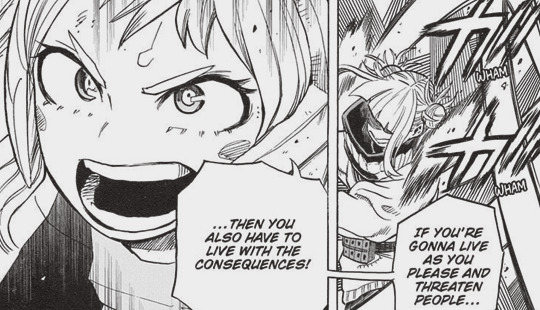
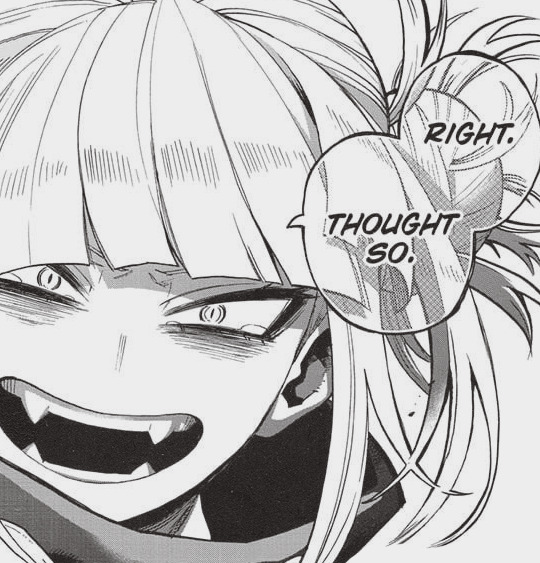
Toga and Uraraka can’t understand each other: because Toga can’t explain herself properly, and Uraraka doesn’t really want to understand. However, there’s also a narrative reason behind why these two characters are fighting each other. It has nothing to do with morality, good or bad, hero or villain, but rather the writing of the characters themselves. Toga Himiko and Uraraka are foils, two sides of the same coin meant to reflect each other. They are essentially (in narrative terms at least) the same person, just both of them expressing different sides of themselves. Uraraka Ochako represses, and Himiko Toga expresses herself, more on their foiling underneath the cut.
Before I start out I just wanted to point out a few of the deliberate paralels the narrative draws between the two characters. First, the girls come from completely opposite circumstances.

Uraraka comes from a poor family, whereas Toga comes from what seems to be a wealthy household, considering there’a a gate in front of their door.

Typically Himiko would be the privileged one, but the narrative inverts this. Uraraka grows up in a household where her identity is affirmed by her parents no matter what. Himiko grows up in a household where she is constantly told she is wrong by her parents.


Ochako is continually accepted for who she is, and Toga is told not to be herself, not only suffering parental abuse, but also psychiatric abuse on top of that.
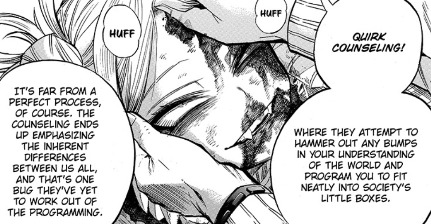
One more way in which they are opposites, Ochako is someone who tends to be sheltered (her parents did her best to hide the fact they were suffering from her because she didn’t want her to feel guitly about it, however it produced the opposite effect, Uraraka got better at reading the faces of people and noticing their suffering.)
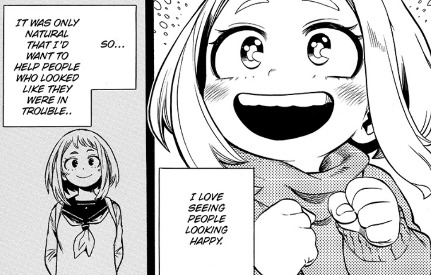
Himiko on the other hand has grown up very unsheltered, she’s been on her own since middle school. There’s several hints she’s been exposed to the ugliest side of people already and spends her life running away from them and keeping herself safe from them.
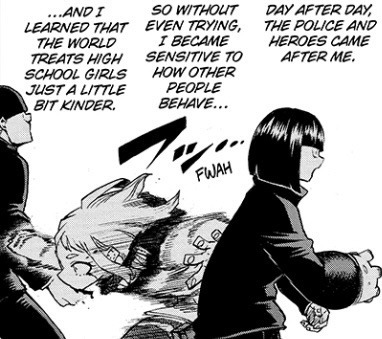
Himiko and Uraraka are both incredibly good at reading other people, but they developed this ability for opposite reasons. Uraraka who was sheltered noticed the pain her parents tried to hide from her and developed it compassionately, and Himiko who has been on the run for most of her life developed it as a method of survival. However, that doesn’t mean that Himiko is lacking compassion, or Uraraka always empathizes with everyone she meets, because both of them are complex individuals.
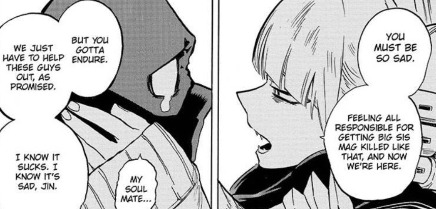
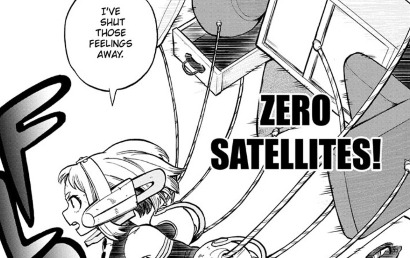
Himiko is capable of empathizing with other people, not only that but she’s grown significantly out of her shell and learned that other people besides her have needs, feelings she needs to take care of, to the point where she’s stopped prioritizing herself first in all circumstances. On the other hand, Uraraka is just as capable of shutting her feelings down and ignoring the viewpoints of other people she finds disagreeable with her own.

Uraraka and Toga are also both extremely social people, however all of Uraraka’s friends accept her for who she is. Deku knows Uraraka so well that he can tell when Toga, pretending to be Camie, is the one replacing her. Toga is someone who like Uraraka was always at the center of a group of friends tying her together. However, Toga could only present her fake self in front of them.
1. The Repressed

Jung divides the self into three, the shadow, the persona, and then the ego (self) which is made of a combination of the former too.
Persona
The persona is how we present ourselves to the world. The word "persona" is derived from a Latin word that literally means "mask." It is not a literal mask, however.
The persona represents all of the different social masks that we wear among various groups and situations. It acts to shield the ego from negative images. According to Jung, the persona may appear in dreams and take different forms. [source]
Shadow
The shadow is an archetype that consists of the sex and life instincts. The shadow exists as part of the unconscious mind and is composed of repressed ideas, weaknesses, desires, instincts, and shortcomings.
The shadow forms out of our attempts to adapt to cultural norms and expectations. It is this archetype that contains all of the things that are unacceptable not only to society, but also to one's own personal morals and values. [source]
My Hero Academia uses Jungian Symbolism, especially in regards to Himiko and Uraraka’s characters, this isn’t something I made up it’s directly in the text. Toga’s act of repression is literally called: wearing a mask.

Toga and Uraraka are written to contrast each other on which part of themselves they present to the world. Uraraka is extremely conscious of other people’s expectations of her, so she plays up her persona. Uraraka is someone who is always putting up a show for others because she knows how they perceive her.
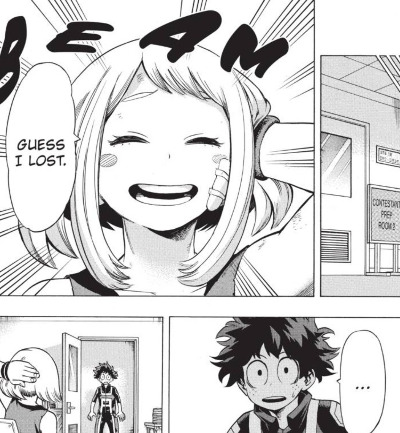
Her own perceptiveness works against her, because while she loves seeing people happy the most she also can’t stand to see them in pain, or even be the reason why they’re in pain. Uraraka’s solution to this is a rather immature one, she believes if she’s good all the time, if she’s always this pleasant and happy person and never shares her problems then she won’t drag the mood down.
Uraraka is conflict avoidant in other words. There are times she directly addresses the conflict like the times with Tsuyu, but even then it’s in a “We should all get along as friends” sort of way. Uraraka always pushes her feelings down and tries her hardest never to cause trouble for others. However there’s a line between trying not to hurt others, and simply pretending the conflict does not exist.
The shadow is the part of ourselves we repress in order to play for other’s expectations. The persona is a performance, it’s the personality you perform every day. You would swear with a group of friends, but you wouldn’t swear in front of your grandparents. People hide parts of themselves depending on who they’re interacting with, personality is in part a performance to the expectations of others around you, that’s natural. Everyone will have a side of themselves they show to others, and a side of themselves they keep repressed. That’s natural. What is not natural is to be all one way or all the other.
‘Man is not truly one, but truly two’ “Dr. Jekyll and Mr. Hyde.”
The point of the shadow and the persona, is that both are true at the same time. You are both who you pretend to be, and what you hide of yourself. The persona is not fake just because it’s a performance, and the shadow isn’t the true self or all there is to you just because it’s hidden. However, the opposite is true at the same time, the persona is not all of who you are, and you can’t make your shadow go away just by repressing it.
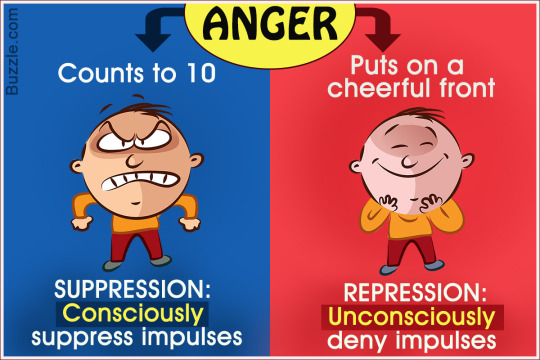
Psychological repression is not a healthy strategy for dealing with emotions. It doesn’t resolve emotions, it just makes them go away for a short time. One response to the presence of a shadow is to simply ignore it, but ignoring it will just make you ignorant.

Uraraka views herself to be a good person, and views heroes to be good, but that belief hasn’t come from confronting the bad of society and deciding that heroes are still good anyway. Which is my point, not that Uraraka is wrong, but that she’s ignorant. She’s sheltered, naive, and her lived experience is so narrow she can’t realy make a judgement call on Toga that’s accurate. Like, just for exmaple heroes do in fact kill people. They even get excited about completely destroying villains.
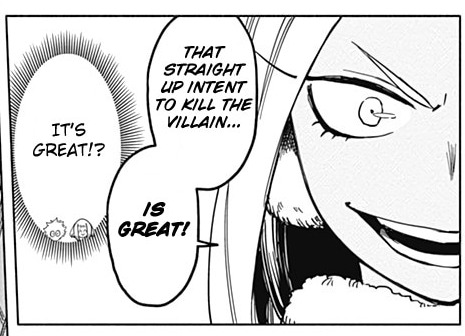

There are heroes who become heroes just to beat the shit out of villains, there are heroes who will try to kill villains, Tokoyami gets confronted with the fact that Hawks killed a villain and his first response is: You did nothing wrong, Hawks. Uraraka sees heroes as the ideal only ever saving people. Yes heroes save people. There are other heroes who are violent. It’s not one or the other, the truth requires acknowledging both at once. Uraraka’s point that she would never feel happy about violence is a false one, because she doesn’t know that for one, and two heroes are just as capable of violence as villains.
The key point to repression is that it doesn’t work.

Himiko already tried reperssing herself and it just drove her insane. The feelings don’t go away simply by pretending that they are not there. Even in a narrative sense, Uraraka’s shadow that she has repressed has escaped her in the form of Himiko and is running around constantly trying to challenge her and confront her to get her to acknowledge those feelings. The feelings will not go away, and Uraraka’s solution is to just keep putting a lid on them and pretending they are not there. It’s because she has such a tight lid on herself it makes her impossible to see things from Himiko’s point of view.
Why is Uraraka supposed to understand things from Himiko’s point of view?
Because Himiko is Uraraka, she’s all of her repressed flaws come to roost. Uraraka cannot change or improve as a person until she accepts both the best and worst of herself instead of just trying to always be good all the time. Understanding Himiko leads to a more gray and nuanced understanding of reality rather than the black and white: heroes good, villains bad. Himiko is a foil, a narrative device used to show the flaws of another character.
Uraraka did nothing wrong / Uraraka is right.
Well okay then, but Uraraka would be a pretty boring character otherwise. She’d just be a good girl who did good things all the time and always tried her hardest. I’m not trying to insinuate Uraraka is a bad person, I’m arguing in favor of her complexity. I think there is more to her character than just her trying to be a better hero, and getting stronger and learning to use her powers better. There’s an emotional complexity to Uraraka that she represses.
Emotionally, Uraraka is similiar to Himiko because they both cope poorly in the same way. Emotional repression is unhealthy. Himiko has only two modes, repress everything or don’t repress anything and both of those extremes are bad. Uraraka is on the path to becoming Himiko, because the only way she knows how to deal with things is to shut her feelings off and as Himiko said that doesn’t work: it just drove Himiko insane.
2. The Expressed
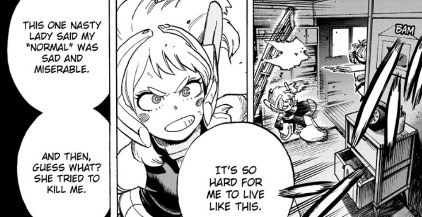
Himiko Toga is who she is in reaction to her trauma. Uraraka pushes herself down and tries to play to the expectations of others, and Toga asserts herself and tries to defy other people’s expectations.
I’m actually going to blow everybody’s minds here though: Toga doesn’t actually want to murder people and suck their blood dry. It’s what she thinks she wants, but once again, she is who she is, in reaction to trauma. Toga was violently abused, Toga became violent, but it’s not who she is inherently. It’s who she thinks she is.


Toga has internalize every bad thing every person has ever said about her. Toga not only foils Uraraka, she also foils Shigaraki. Toga has been convinced, that what she wants naturally, is to suck people’s blood, and kill them. The same way that Shigaraki has been convinced by AFO that he was naturally born with the urge to destroy others.

These aren’t things that they have a natural inclination or desire to do, it was things they were told about themselves repeatedly. Shigaraki by AFO, and Toga by everyone around her. Even Toga’s initial incident of violence has a lot more in common with a psychotic break, then with you know, a pre-meditated murder that she did for pleasure.
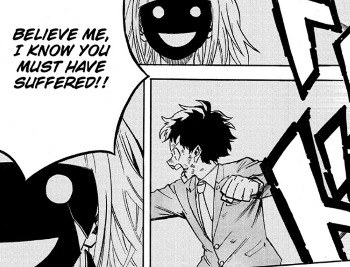
It’s not something Toga naturally did on her own, it was something she was pushed to do. Remember, Toga suffered twofold abuse. Abuse from her parents, but also psychiatric abuse. The people who were supposed to help her reconcile her quirk, and her unnatural tendencies didn’t try to heal her like they were supposed to. She was demonized by everyone around her, told what a bad girl she was constantly, not for anything she did wrong but because she was born naturally with a quirk. She tried to be good and smile for the sake of others, untils he reached a breaking point: then and only then did she lash out.
Toga’s initial instant of violent wasn’t a pleasure killing.
It was a lashing out due to a psychotic break, and it was because both of the systems in her life that were supposed to help teach her to learn to deal with emotions, quirk counselling this world’s version of child therapists, and her own parents, chose to demonize her and tell her to repress herself.
However, children who are abused tend to internalize the words their abusers tell them. Children who are abused often believe they “deserve” their abuse because of their bad behavior.
Now, I’m not trying to justify. I don’t think Toga Himiko is allowed to run around killing whoever she wants just because she was abused. My intent is to explain how her brain works.
Toga Himiko doesn’t get to lash out as she pleased, but I think it’s important to understand that Toga’s lashing out is what makes her human. She’s not an inhuman monster, she’s a human reacting to circumstances. Most people exposed to ugly situations, react in ugly ways, and the few that don’t are the exception that proves the rule.
My point being that Toga is not an insane monster that lusts for blood, she just believes herself to be one. The same way that Uraraka is wrong, Toga is also wrong at the same time.
Because as I said the above is right. Toga can’t live her life just lashing out. While it’s understandable, someone who has endured violence can’t keep lashing out violently forever. Toga’s choice to always lash out is just as unhealthy as Uraraka’s choice to always repress herself.
Because Toga relies again and again on violence to vent her feelings, violence has become an inescapable part of her life. It’s also contrary to what she really wants. Toga thinks she wants violence, but the violence is just a reaction to the violent abuse.
Yes, Toga says all she wants is to drain people dry of their blood but characters are liars sometimes.
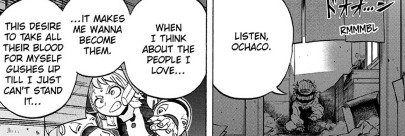
Sometimes you can’t take a character at their word. Sometimes instead of reading something directly as stated line for line in the story you have to read between the lines. Toga says she wants to just kill people, but her internal thoughts contradict her.
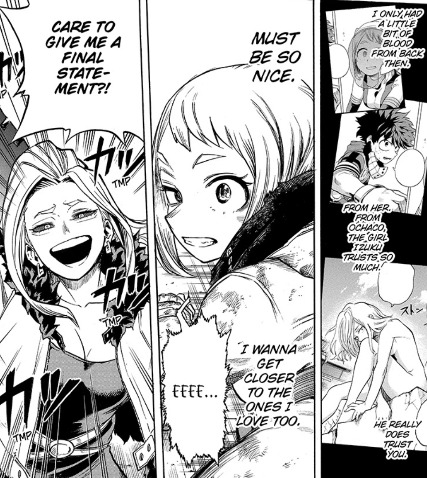
What Toga needs is to be accepted, loved, and trusted like Uraraka is. That’s her deep internal desire that she states to herself when pushed to her absolute edge by Curious. What Toga thinks she wants is to drain the people she wants dry of their blood, so she can become them and live vicariously through them. What she thinks she wants is a life where she can do whatever she wants, and do as she pleases, in response to a life where she wasn’t allowed to do anything that she wanted. But, that again is a child’s idea of rebellion. It’s a response to her abuse, it’s not who she is. However, Toga’s personal development was forwarded not by killing people and draining them, but by the empathy and acceptance she showed towards Jin.
There’s what she needs, what helps her develop into a more stable person, the empathy and care she shows to Jin. The acceptance Jin showed her in return.
There’s what she thinks she wants, which is to just rebel against everything and always do what she wants in every single situation and accept no limitations on her personal desires.
Toga is in fact just a normal girl, who wants to be accepted by the society at large, or at least find people who accept her. However, Toga doesn’t see herself as one, because she’s internalzied the idea that she’s the blood thirsty monster that everyone thinks she is. Which is why Toga contradicts herself.
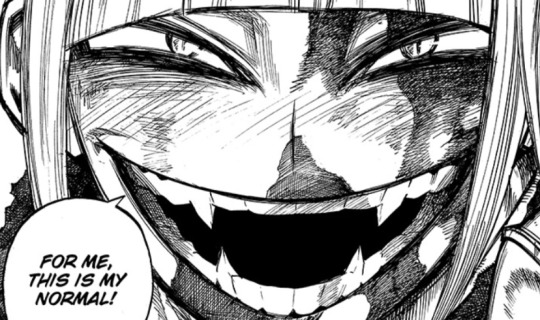

Toga in the same breath will say “I’m also a normal girl” and then “I’m a weird kid, I’m a weirdo, no one can understand me.”
Toga cannot explain herself, because she’s wrong about herself. She’s making herself out to be a violent monster because that’s how she copes, the really really bad way she copes. It’s easier to be a violent monster, she’s more protected that way, then to be a runaway girl who’s just scared and alone. However, because Himiko can’t admit this, she also can’t explain herself to other people. She presents the monstrous version of herself and that’s all Uraraka can see.
Neither Uraraka nor Himiko’s way of coping is sustainable. Uraraka cannot keep repressing herself forever, the same way Himiko cannot violently lash out forever.

While what Uraraka says is very black and white, it’s not wrong. If HImiko is goign to live her life “Kill or Be Killed”, then she’s just as likely to end up being killed then she is to be the killer. There’s no happy ending to that kind of life.
However, there is no happy ending to Uraraka’s way of living either. Her perfectionist tendencies and her desire to only ever be good just aren’t going to work, because one a lot of bad things are going on already Uraraka just doesn’t see them, and two it’s not sustainable, Himiko was someone who held everything in too and look where that got her.
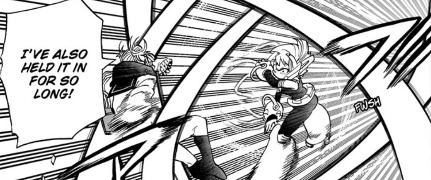
Uraraka and Himiko’s talk failed because neither of them are capable of communicating right now. Uraraka can’t understand because she doesn’t try, and Himiko can’t explain herself because she also doesn’t try.
Uraraka only sees what’s good about the world, about heroes.
Himiko only sees what’s bad about the world, about heroes.
Uraraka sees the beautiful parts, Himiko embodies the ugliness.
However they are both wrong because they are both short sighted. People are not just their shadows, and they’re not just their personas. They are both at the same time.
A junagian shadow confrontation doesn’t end in a fight between good or evil. The shadow is not evil, the persona is not good. They are just two halves of the same person. Defeating a shadow does not make it go away. The shadow is something you have to learn to live with, the same way everybody on earth is flawed, and just tries to live every day working on their flaws the best they can.
The shadow is something that has to be reconciled.
Uraraka and Toga don’t have to defeat each other, they have to reconcile with one another.
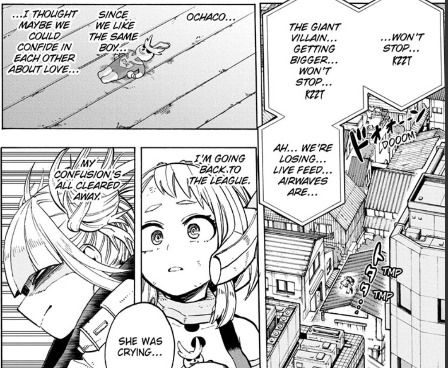
The narrative is pushing their reconciliaton because Toga and Uraraka both have what the other needs to grow. Uraraka is ignorant because she’s lacking experience. She hasn’t lived Toga’s experiences so she doesn’t understand her perspective. She doesn’t know, and she won’t know until someone explains it to her. However, saving as many people as possible means that Uraraka should also be open to trying to save people who react to abuse in ugly ways as well, because a person can be a victim and a villain at the same time. Uraraka will be a better hero if she’s able to see the flaws in her own society, because she’s a part of the next generation to reform society.
And Toga can’t become someone who is trusted by others if she’s violently lashing out all the time. The same way that Uraraka needs to see what’s bad about the world, Toga needs to learn to see what’s good about the world. The same way Uraraka needs to see both sides of the world, that of a villain girl and that of a normal girl. Toga needs to come to terms with herself, that she’s not a violent monster, but a normal girl. The only way she can stop lashing out and start actually taking responsibility for what she’s done and start on the path to self improvement is if she starts seeing herself as a person capable of improving.
Toga wasn’t born this way she was made this way. She’s just a people, and people change. Toga can either try to change, or keep lashing out forever but at the moment she doesn’t even know that changing is an option for her. She thinks she’s going to be stuck as a monster forever because she was just born one. That’s why, Toga also needs Uraraka as much as Uraraka needs her.
#togachako#uraraka ochako#ochako uraraka#himiko toga#toga himiko#lov meta#mha meta#league of villains meta#my hero academia meta#league of villains#toga himiko is a terrible person#yeah but she's fascinating#besides it's not like she killed YOUR MOM#she hasn't hurt anybody in reality#she's a character in a narrative and we can analyze her without the need to moralize her#because obviously killing is bad#but like beyond that it's constructive to look at her and try to understand her as a person
303 notes
·
View notes
Text
Day 5: Imaginary Friends and Repressed Subconsciouses
https://homestuck.com/story/836
We open to Dave having the shit - and the softness - beaten out of him by Bro.
https://homestuck.com/story/838
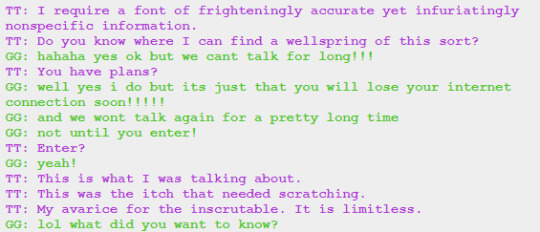
These are exactly the sort of things a void player would say. This page lends itself to the interpretation that Rose is inverted and acting more like a Witch of Void than a Seer of Light, exactly the same way that Jade is acting like a Seer of Time. (Of course, Rose is either being sarcastic or placating herself. The reality is that, as she pretty much immediately demonstrates, she can’t help but pry for the true underlying meaning of what Jade is saying, grasping at information, and with it, power over her situation.)
I’ve already called attention to the dearth of conversations between these two characters - they’re not going to talk a lot between now and when Rose goes Grimdark. I think it’s just a shame. I wonder if it’s because Rose feels like Jade has her life under control, yearns for that, and in typical Rose fashion, decides that Jade is judging her for her lack of control? She is remarkably cool toward Jade, and I expect that to at least some degree, it’s because she feels inferior to her.
@volatileleporegina and I had a discussion on Discord where they guess that this is like, the dichotomy between Seers and Witches.
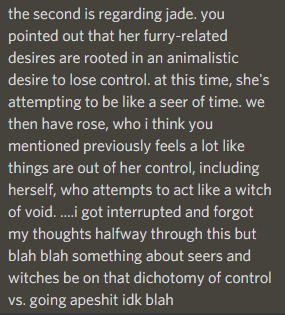
Rose probably envies the fact that Jade has her shit together. Witches are at their best and their happiest when they can go apeshit, seize control of a situation, and act completely on instinct. Seers are at their best and their happiest when they have inner peace, control of their situation, and control over their emotions.
More after the break.
https://homestuck.com/story/845
More speech patterns here. John does not use a lot of prepositions, and his language is very hesitant - he rarely asserts anything important, and has a pretty strong tendency to use phrases like “I guess, I figure, I think, I might” and so on and so on.
John also talks like he’s from the west coast of the USA, at least in a caricaturish way - he uses a lot of old school surfer slang that got co-opted into generic cool culture, like rad, although not nearly to the same extent as later parody character Latula.
https://homestuck.com/story/855
As a character who will eventually be revealed to be a Hero of Hope, Grandpa Harley dwells in the realm of fantasy. While he fills the mould of the idealized adventurer-hero - a true Pulp Fiction Macho Genius Archaeologist in the mould of Doc Savage or Indiana Jones, his relationship with other human beings is more... theoretical.
I wonder if it says anything about Hope in general that all of the Heroes of Hope in the story are practically incapable of having positive relationships in their lives? Before I tended to chalk Jake’s failure up to being a Page, and simply needing more time, but Eridan and Cronus sabotage all of their relationships as well.
Perhaps I’ll come back to this train of thought in the future. For now, Grandpa and Jake alike are characters who I consider wretches, and pitiable wretches at that. I have far less patience for Grandpa though. More of that as we go.
I should be open about the fact that, while I’ve been a bit more forgiving with Mom Lalonde, the fact is that, with the exception of Dad Egbert, I consider all four of the Beta Guardians to be abusive parents; Nanna is an exception as well if she is counted to be one of the guardians). Their conduct in raising their children is at the very least inexcusable, although if they demonstrated any repentance, it would perhaps be forgivable; in all their cases, by the end of the comic, it is too late for that (although they get another lease on life through the Alpha Kids, which if you don’t mind me showing my hand, I think is the entire point of the Alpha Kids from a storytelling perspective- reconciliation of the parents with the children.)
https://homestuck.com/story/859
One thing I have always liked about Jade is that she does not negotiate with terrorists. You go girl :)
https://homestuck.com/story/874
Rose lives in either Ontario or Upstate New York. I think someone found that the coordinates of her house are in Rainbow Falls.
It seems odd to me for no reason at all that Rose would be a Canadian when all of the other characters in the comic are ambiguously American, and there are a number of other reasons it would fit for Rose to be from upstate NY, not the least of which is that it is a part of Lovecraft Country, and the home of the principle madman from HP’s “Beyond the Wall of Sleep,” a story about a hick from Upstate New York who has insane dreams that he cannot express with his limited vocabulary. It turns out that this unassuming crazy person is actually a mortal manifestation of an extra-dimensional star-god, and he forms a friendship with the viewpoint character, an intern at the hospital where he has been institutionalized. While the magic dreams ultimately prove to be too much for the mortal frame and give him a heart attack, he contacts his friend the intern via a dream to express to him that he dearly hopes that the two of them meet again one day beyond the wall of sleep.
Another reason is that I’ve always viewed Rose as being an extremely affected person. Nobody talks the way that Rose talks - her words are all extremely deliberately chosen in a way that doesn’t fit the pattern of the other characters’ more stream-of-consciousness writing styles. Rose thinks in Prose, whereas her friends all write like they talk. I like to imagine, for this reason, that Rose has a transatlantic accent like Katharine Hepburn, which is to say, a learned accent. Back in old-timey times, actors, newscasters, the wealthy, and so on would take classes to learn how to pronounce words in a sophisticated way that nobody naturally spoke in - a bit like Received Pronunciation on the other side of the pond. It’s long since died out, but it fits the sort of affected, stuffy, faux-aristocratic manner that Rose styles herself with. It’s a blend of Manhattanite and Londoner pronunciation, and I think it suits her.
Anyway, there you go. There’s something that you just learned about my inner life and how I think way too much about tiny details like “What would Rose’s voice sound like?”
https://homestuck.com/story/876
Dave lives in Texas. For this reason, I have decided that he sounds like a cowboy. No particular cowboy, just some cowboy.
Jade lives in the Pacific Ocean, and I have a very specific head voice picked out for her - Anna Paquin, particularly young Anna Paquin who portrayed Sheeta in Castle in the Sky, although I’ve always imagined Jade to have a much broader kiwi accent.
https://homestuck.com/story/879
I wonder if Nanna’s oven works at all like Biscuits’?
https://homestuck.com/story/893
Nothing ever really came of Dr. Brinner’s mail. Law of Conservation of detail tells us that he might be one of pipefan413′s coworkers (maybe fedorafreak?) but we’ll never know.
https://homestuck.com/story/905
It’s not totally clear to me exactly what’s going on here, but I have a couple of theories.
Theory #1: This is Mom Lalonde’s childhood room from when she grew up. It makes sense to me that the Lalonde House and the Lab might be a package deal, especially since we see Roxy growing up in a similar setting, but with far more prolific modular structures.
Theory #2: As theory #1, but this is also Mom Lalonde’s current accommodation. Tea parties and tea seem to be shorthand in Homestuck for immaturity and avoidance in particular - characters like Nepeta, Mom, and Grandpa use Tea Parties to retreat into childish fantasy instead of confronting the real, hard problems they have to deal with.
https://homestuck.com/story/919
Jade’s strife with Grandpa might lend some credence to the idea that she uses imaginary friends (who are also us, the audience!) to cope with her loneliness.
https://homestuck.com/story/926
Even the extraordinary cynicism and antipathy of Rose Lalonde can’t resist adorable kittens.
https://homestuck.com/story/935
Jaspers’ secret seems to be the genetic code of a First Guardian, although whether Rose actually got it from this mysterious kitty-cat, or whether it was buried in her subconscious all along is probably a coin flip. (I would put my money on the subconscious thing.)
https://homestuck.com/story/938
For all her pretension, Rose Lalonde is a sad thirteen year old girl whose mother spends too much time sozzled to help her make sense of a confusing and chaotic world. It would be nice for her to be able to make sense of the world and get some sense of constancy, but then part of the point of Sburb is to teach its players that nothing in life is constant.
https://homestuck.com/story/949
Resolving some of the uncertainty around his Dad will allow John to consciously perceive the graffiti he’s been subconsciously scribbling around his room. You knew that already, but it doesn’t change the fact that this is a big deal for him. I’ll take a stab at why this is the case - one of the recurring motifs in Homestuck is characters avoiding uncomfortable truths through avoidance and stagnation - if they don’t want to think about something, they really really don’t think about it, to the point of not being able to perceive it at all. Here, John magically gains the ability to see some of the graffiti drawn by his dream self by being confronted with the truth about his Dad. For other characters, I think, it will be less magical.
https://homestuck.com/story/965
Calling attention to John’s lexicon again, I feel like it’s an overlooked fact that he uses turn of the decade hacker slang a lot too - just peppers his language with it.
https://homestuck.com/story/980
Jade, like John, actually has two separate Guardians - her deceased bio-parent, and this devilbeast. The terminology for these white-and-electric-green monsters, First Guardians, suggests that from a mythological perspective, they function as Ur-Parental figures, raising a civilization to adulthood so that its members can go on to play Sburb, participating in the reproductive cycle of the Universe.
https://homestuck.com/story/988
The fact that Mom Lalonde’s “Room” is full of booze supports my hypothesis that she still lives in her little girl’s lab bedroom.
Rose doesn’t make a big deal out of what’s in her Mom’s bedroom the way that John is, but I think that her exploration of the laboratory serves as effectively a long-form version of the same experience that John has just had. They’re both learning plenty about their enigmatic guardians.
Rose is a smart girl. She’s figured out what is going on, even if she hasn’t thought about it at the surface-level of the narration yet.
https://homestuck.com/story/1004
John Egbert is a young man who does not really like himself very much.
https://homestuck.com/story/1023
The very first time Rose shows genuine vulnerability to pretty much anyone in the comic. “Maybe I am just being a friend?”
https://homestuck.com/story/1028
Dreams in Homestuck are material events than can have material effects on the characters’ reality - but on the other hand, spending loads of time dreaming can prevent you from having a meaningful effect on your session.
Homestuck is a little ambivalent about dreams but I think it’s safe to say that something close to is stance would be to say that what goes on unacknowledged inside of your head is still a part of you even if you can’t perceive it. Characters who spend all of their time in dreams though, paradoxically won’t make all that much progress toward actually understanding it. Tavros and Jade both spend loads of time in their dreams on Prospit, and while Jade does it because she has Vriska-induced narcolepsy, I think we’re supposed to draw a line from one to the other.
Neither of them is in an emotional state to tough out the process of digging up what’s beneath the surface, and resolving the tension between what’s inside of them and what’s outside of them.
https://homestuck.com/story/1049
This creepy little guy is here because Gamzee sent him. I’m going to pay careful attention to the sequence of events that leads him here, because I have a hunch that John’s weird clown fixation somehow leads to Gamzee’s.
https://homestuck.com/story/1064
The fact that the Joker only has two holes in his punchcard suggests that clowns come very close to being elemental in the Homestuck universe.
That is not a surprise.
https://homestuck.com/story/1069
We’ll conclude the day with John’s alchemy session, and come back tomorrow where I’ll finally get around to stating another one of Homestuck’s major throughlines. For now though, I’ll point out that pretty much everything John has created here has some kind of Dad imagery or another (Although all the Cosby gags have aged incredibly poorly, don’t forget that at one point he was America’s Dad!)
With the possible exception of the Bunny Wizard hat which combines some Rose imagery with some John imagery! No wonder she thought it was as cool as he did.
For now, Cam signing off, something something not alone.
#commentary#liveblogging#homestuck#katharine hepburn#anna paquin#tea parties#dreams#perception#subconscious#dads#guardians
12 notes
·
View notes
Text
"Diabolical Disorientation" is one of the prophesies of Fatima. Sister Lucy of Fatima Warned About it Many Times.
.
Disorientation: The condition of losing one's sense of direction. A state of mental confusion. Inverted.
.
We are living in a very confused and inverted world right now, just as was prophesied at Fatima. Evil is perceived as good, true is perceived as false and vice versa. etc.. "Woe to those who call evil good and good evil.
.
Diabolical Disorientation
An Explanation of the Current Crisis
.
FR. NICHOLAS GRUNER, S.T.L., S.T.D. Taken from the Summer, 2006 Issue, THE FATIMA CRUSADER
.
NOTE: The term "Diabolical Disorientation" comes up in conversation more and more frequently. What is it? What does it mean? What does it have to do with me? Father Gruner answers your questions about this epidemic that has been slowly infecting large segments of the Catholic Church collectively as well as many individual souls of the Faithful.
.
WHEN a person is disoriented, he is in a state of confusion and loses his bearings. He does not understand things clearly. It's similar to being away and sleeping in a room where the bed, the window, the door are all different from your own room at home. And upon waking up suddenly in the middle of the night, you are at first disoriented, confused----Where am I? Where's the door, where's the window? So most people have actually experienced disorientation.
.
Diabolical disorientation, on the other hand, is when a person is when a person is disoriented by various tricks of the devil. These diabolical tricks are not simply a kind of possession portrayed on television and in the movies. The devil, the purveyor of diabolical disorientation, manages often to give the targeted person a perception quite different from reality and yet, the person so diabolically disorientated is convinced what he thinks is the truth when it is actually a lie.
.
Individuals and Society are Affected!
.
The devil disorients individuals by making them think that because of their wealth and successes, they are being blessed by God, when, at the same time, they are committing sin, cheating and lying, and are hurling themselves headlong into Hell.
.
Even worse than diabolical disorientation of an individual, is the disorientation of a whole society, which insults and ignores God and His Mother.
.
The devil has so many running after power, money, illicit pleasure, false ambition, killing their own babies in their wombs. The most precious gift in the world is children, yet the devil obviously tricks them into thinking they are doing a good thing by aborting them.
.
Doctors, nurses, politicians, even the general public who support abortion, are disoriented----and it is having deadly effects, killing 50 million babies per year, plus sending the perpetrators to Hell for all eternity if they do not repent.
.
Even Some Catholic Networks are Disoriented
.
Disorientation on a larger scale is described in EWTN: A Network Gone Wrong. This book exposes how EWTN, a so-called Catholic television network, leads even practicing Catholics astray by broadcasting their heresies and their own brand of disorientation as if it were all "gospel truth".
.
The disoriented leadership of EWTN is deceiving many Catholics who have received the truth of the Faith by Baptism. These Catholics at EWTN acknowledge the true Church of Christ. Yet, they go ahead and, at least implicitly, deny one or more articles of the Faith, which makes them material heretics.
.
Once a Catholic becomes aware that his error is directly contrary to the Catholic Faith and becomes stubborn in not rejecting the error, he becomes a formal heretic, not just a material heretic.
.
A material heretic is a person who believes a heresy but does not know that it is a heresy; for example, if a person thinks that he can be good without the help of God's supernatural grace, and does not realize that this is the heresy of Pelagianism (Naturalism).
Thus, in good faith, being unaware that his theory is heretical (because no one ever points it out to him) we have to assume that he is not a formal heretic. He is not refusing to accept what. the Catholic Church teaches, but he, apparently, is just ignorant of what the Catholic Church teaches.
.
A formal heretic, on the other hand, is a person who knows that what he believes is contrary to what is defined by the Catholic Church. Following our above example, the Catholic Church solemnly teaches that in order to be good, we must have supernatural grace, but despite knowing that, the formal heretic refuses to accept that doctrine and still claims he is a Catholic.
.
A formal heretic cannot be a Catholic because a formal heretic ipso facto (that is, by the act of committing formal heresy), cuts himself off from the Church and, therefore, is no longer a Catholic. Not every sin cuts a person off from the Church, but the sin of heresy does.
. Thy
The diabolical disorientation that we are experiencing today is not only that most non-Catholics are disoriented, it's also that they are unaware that what they are doing----refusing to enter the Catholic Church----is seriously sinful; and also that they are unaware of why God created them and unaware of what they must do to get to Heaven.
.
The diabolical disorientation we are talking about here is the disorientation of Catholics who think they are serving God, but embrace beliefs and practices which are gravely contrary to what the Church always taught and practiced. This disorientation has been produced in individuals and in large segments of the Catholic population, by the devil.
.
The Blind are Leading the Blind
.
Our Lord spoke of this when He said of the Pharisees: "They are blind, and leaders of the blind . . . and both fall into the pit [of Hell]." (Matt. 15:14) If a blind person allows himself to be led by another blind person, chances are that both of them, the leader and the led, will fall into a ditch or deep well. What would happen to a man who is physically blind would also happen to one who is spiritually blind. He loses his way, doesn't know where he's going, and following a blind leader, will most certainly end up in the wrong place----Hell.
.
That is what is happening today. The diabolical disorientation is not only among simple people, not only among the sinners who do not try to keep God's law, but this diabolical disorientation has affected the leadership as well.
.
In fact, it seems that it is the leadership in the Church, most of all, that is suffering this diabolical disorientation.
.
Sister Lucy talked about this in her various letters which are quoted by Frère Michel. She also spoke about it in her interview with Father Fuentes, when she said:
.
"The devil knows what it is that most offends God and which in a short space of time will gain for him the greatest number of souls."
.
"Thus the devil does everything to overcome souls consecrated to God because in this way, the devil will succeed in leaving the souls of the faithful abandoned by their leaders, thereby the more easily will he seize them."
.
There are a number of pious Catholics who go to church on Sunday and say their prayers, but who also are infected by this disorientation. That is because they are trusting these blind leaders, contrary to the graces of their Baptism and the graces of their Confirmation. They are trusting them when they say, "Follow us, we're orthodox, conservative, true Catholics . . . follow us!"
A large number of disoriented people in the Church are spending a lot of time claiming to be living their religion when, in fact, they're serving the devil. That is quite a feat for the devil to get those who serve his ends to make them think and really believe they are serving God, when they are serving Satan. This is the epitome of diabolical disorientation.
Where Did the Phrase "Diabolical Disorientation" Originate?
We can thank Sister Lucy of Fatima for coining the term. You will find it in her writing, especially between 1969 and 1971. Time and again, she comes back to this statement.
With so many changes going on in the Church since Vatican II, faithful Catholics and friends reported to Sister Lucy, strange activities of various clergymen, bishops and priests. The Catholic faithful knew that something was wrong. And so they asked Sister Lucy for her advice on this. She explained that it is diabolical disorientation. The devil is behind it, she said, and the devil has misled many people, surprisingly even bishops and Cardinals; and although she has not said it, maybe even the Pope himself.
Why Haven't We Heard of This Threat Before Now?
It may be that it wasn't Sister Lucy that came up with the term but rather the Blessed Virgin Herself, in the Third Secret of Fatima. The Third Secret was supposed to be released by 1960, but to date, it still has not been fully released.
The Third Secret foretells our time of apostasy in the Church. We know this because Cardinal Ciappi says: "In the Third Secret, it is foretold, among other things, that the Great Apostasy in the Church begins at the top." This means a number of Cardinals and bishops and priests in the Vatican are misleading the faithful and leading them into apostasy.
That is, many faithful are being led into heresy, schism and rebellion against the doctrinal teachings and the moral teachings of God as taught by the Catholic Church for 2000 years. If you look around today, so much of what goes on in the Church is contrary to what the Church consistently believed and practiced for centuries.
We were warned in the Third Secret to be on our guard against this diabolical disorientation and its purveyors and promoters. Especially, it warns us to be on guard against bad shepherds. We say bad, not in the sense as to whether they are guilty or not, but bad in the sense that they are misleading the sheep towards Hell instead of towards Heaven.
Since Pope Pius XII chose not to release the text of the Secret before his death, it was left in the hands of some disorientated people, Cardinals and bishops, who, in turn, apparently recognized that it was they, themselves, and their heresies and apostasies and schisms, that were being described in the Third Secret.
.
On the one hand, they told themselves that they don't have to believe this Message of Fatima because it's only a "private revelation". On the other hand, they were committed in their hearts and minds and public positions to embrace the errors that their disorientation had given them, so they used all their power of influence, their position and power of persuasion to see that the Third Secret was never released.
So, in general, the faithful have gone on believing these diabolically disorientated priests, bishops and Cardinals, while those same churchmen in high authority, through their own private access to the Secret, were able to be forewarned and able to recognize the primary opponents of their errors.
Those who promote the full Fatima Message are the very ones the diabolically disoriented clergy have most to fear from. Therefore, they put the brunt of their attacks on those who are Marian and promoting the full Fatima Message, as well as to attack those who uphold traditional beliefs and practices, because that is where the devil, through diabolical disorientation leads his assault against souls. If he can cut souls off from the Faith and from channels of grace then he is certain to drag them to Hell.
Fatima Warning Buried With the Third Secret
The leaders of apostasy have silenced much of the warning and advice coming from Heaven in the Fatima Secret which was meant to be given to the faithful.
Instead, they have intercepted the Third Secret and used it against the defenders of the Church and the Faith.
They buried the Third Secret in 1960 and are still burying it; this is why you have not heard the full Third Secret before now; and why, while they pretend to be promoting Fatima, they are, in fact, fighting Fatima.
We saw this diabolical disorientation in Fatima itself, when the Fatima Shrine authorities allowed Hindu worship in that Catholic Sanctuary in the Spring of 2004.
They presented this to the general public, claiming it to be a holy and good thing. But even if the leadership of the Sanctuary, such as Father Guerra, does not recognize this as an act of apostasy, it is heartening to note that many (some of whom don't even go to church that often) recognize this as an act of apostasy, sacrilege and blasphemy.
Defend Yourself and Your Family
[1] The first line of defense against this diabolical disorientation is to pray, especially the Rosary. Our Lady promises that if you pray the Rosary every day, you will not fall into heresy. And if you've already fallen into heresy, by praying the Rosary every day, the Blessed Virgin will pull you out of it.
[2] Catholics must pray the Rosary every day, especially since they are almost completely surrounded by a leadership that is diabolically disoriented, as well as by peers and colleagues who are following the bad leaders into apostasy. You need to pray at least five decades of the Rosary each day, to keep your senses and head about you and not become infected by this disorientation yourself.
Sister Lucy explained:
"People must recite the Rosary every day. Our Lady repeated this in all Her apparitions, as if to arm us in advance against these times of diabolical disorientation, so that we would not let ourselves be fooled by false doctrines, and that through prayers, the elevation of our soul to God would not be diminished."
[3] Know your Faith better by reading and studying a good Catholic catechism, one published before 1960, such as the Catechism of the Council of Trent or the Catechisms of St. Pius X, or the original version of the Baltimore Catechism published in 1880.
[4] Defend yourself by learning the tricks and techniques of the devil and his followers.
Be informed about some of the players who may believe themselves to be Catholic, but who are promoting apostasy and immorality. Read EWTN: A Network Gone Wrong, which provides a prime example of the diabolical disorientation being peddled out to you by various channels which claim to be Catholic but are not. They may be in good faith but are not teaching the Catholic Faith.
EWTN: A Network Gone Wrong catalogs some of the leading heresies being taught today by disoriented priests, Cardinals, bishops, Brothers, Sisters and so-called Catholic institutions.
Infallible Definitions Cannot Fail
The beauty of the book is that it refers you back to solemn definitions which the Roman Catholic Church guarantees to us are infallible. That is, as long as we are faithful to the sense and the meaning of the words of dogmatic decrees of the Pope and Councils, (not Vatican II, since there are no formal explicit infallible definitions in Vatican II, but all the previous Councils), we are on absolutely safe ground.
Adhere----hold on----to that dogma. Regarding the Faith, we are certain to be on the side of the Angels and of God if we hold on to the Catholic Faith as defined by these infallible definitions. We will thus recognize diabolical disorientation and error if someone, (be he a priest, bishop, Cardinal, Pope, or lay person), contradicts those definitions. We must believe the definitions and spurn the erroneous teachings of those blind leaders of whatever clerical rank. The infallible definitions are paramount.
They are called infallible because the Church tells us these definitions can't fail and that no one, not even a Pope, can contradict them. As long as we believe the infallible definitions we are Catholic and are believing what God, Himself, has taught us through the Gospel, Tradition, Jesus Christ, Himself, and the Bible.
[5] You should also read The Devil's Final Battle which explains to you in even greater detail why we know the Third Secret is about apostasy and why we know it refers to Catholic priests, bishops and Cardinals who are promoting heresy.
This book will also help you to understand their motivation (taken from their own writings) so you can recognize at a higher level what is going on; who really is a friend of God and the Catholic Church and who really is an enemy, even when they believe themselves to be the ones upholding the Faith.
These above five points are things you can do to protect your own salvation. In charity and justice for others, we are also obligated to do something about the diabolical disorientation. You must educate your children, teach them Catholic dogma yourself, because many so-called Catholic schools are teaching heresy. You have to explain to them in detail and at length what the true Church teaches and what the true Church is, and how to identify those who appear to be Catholic but are not really Catholic.
You should also be passing on the word to your husbands, wives, and adult brothers and sisters, as well as to neighbors and anyone you know who is trying to serve God.
We must oppose the present-day diabolical disorientation. Sister Lucy said:
"This is a diabolical disorientation invading the world and misleading souls! It is necessary to stand up to it; and for this purpose you can use what I tell you here. . . "
How To Recognize Diabolical Disorientation
We can recognize an error as something that goes directly contrary to what the Catholic Church has solemnly and explicitly taught, or what the Saints have taught.
Let me give you an example. The Arians were a group of heretics who followed Arius, the heretic, and in 325 A.D. the Arian heresy was condemned by the Council of Nicea. The Arians taught that Jesus is not a Divine person, not equal to God the Father, but that He is considered Divine in some lesser way than God the Father is.
So the Council of Nicea defined for all time that Jesus is God, "God of God, Light of Light, True God of True God, begotten not made, consubstantial with the Father."
The key word is consubstantial! Consubstantial means that Jesus is of the same substance as the Father. There is only one God. God the Father possesses the one Godhead in one way and Jesus Christ possesses the same one Godhead in another way. Both are of the same one substance. God the Holy Ghost is also consubstantial with the Father and the Son.
The Arians, even after it was defined by the Council of Nicea, went underground for about ten years and took that time to remove bishops who were not Arian but orthodox. They maneuvered to have these true Catholic bishops removed from office by one pretext or another, using the laws of the Church and the State to achieve their purposes. They urged some to resign from their office by making life miserable for them.
The Attack Against Christ
In 336 A.D., the Arians changed one letter of one word. Homousion is the Greek word for consubstantial, which is the word used in the solemn definition of the Council of Nicea. The Arians added an "e" to the word to make it read Homoeusion----which means "like in substance". The Arians thus changed the meaning of the definition from "the same substance as the Father" to a mere "like the Father".
By this linguistic gymnastic [similar to what Modernists use today], they were able to cause enough confusion and disorder and get the secular power of the Emperor to promote bishops who were Arian, and not Catholic, to positions of authority in the Catholic Church.
To get the faithful to go along with their heresy, they introduced new practices into the Mass such as Communion in the hand. The purpose of this was to reinforce the belief in the new doctrine that Jesus is not equal to God the Father, so that instead of receiving the Host on the tongue as taught by the Apostles, they treated the Sacred Host as if It were not that important. Thus they encouraged lay people and religious to take the Host themselves.
Catholic reverence and adoration of the Sacred Host was destroyed by the Arians who taught their followers and confused Catholics to not adore Jesus as God, and to not treat Him with the profound reverences He deserves.
.
So in the Catholic Church many faithful were misled by approximately 90% of the Catholic bishops between 336 and 381 A.D. In 359 and 361 A.D., they even had false Councils.
.
They also persecuted faithful bishops and clergy, such as St. Athanasius, who was Bishop of Alexandria in Egypt from 326 A.D. to 371 A.D. The other bishops of Egypt, who were Arian, forced St. Athanasius into exile five different times. Thus he was in exile for 17 of those 45 years. At times, he had to flee for his life.
.
The Arian bishops stopped at nothing. They even accused St. Athanasius of sinning with a prostitute and put him on trial with the prostitute as chief witness. St. Athanasius, familiar with the Gospel, "you must be wise as serpents and innocent as doves" (Matt. 10:16) defeated his enemies at their own game. He was innocent and wise as a serpent. He dressed his own Vicar General in his bishop's robes and went to court dressed as a simple priest. In the courtroom, the prostitute witness pointed her finger at Athanasius' Vicar General and said, "There is Athanasius. He is the one." She was proven to be the liar as it wasn't Athanasius.
.
How to Identify Today's Errors
.
I am telling this story of the Arians for a simple reason. In 540 A.D., approximately 150 years after the Arian heresy was over (as a social force in the Church), St. Vincent of Lerins answers a simple question of the faithful: "How are we to recognize, as a man in the pew, heresy and heretical groups and movements?"
As I recall, St. Vincent poses this problem: "What if some new teaching is introduced in one country or diocese, how is a member of the faithful to react?" St. Vincent says that the Catholic should look to other parts of the Catholic world to see what contemporary Catholics are doing elsewhere.
For example, if Henry the VIII introduces a new communion service into the Catholic churches in England----Catholics in England can get reports of what Catholics are doing in France and thus realize that Catholics there are still attending the same Mass as their forefathers, and not be taken in by the lying novelty taking place in England.
"What then" says St. Vincent, "if the novel practices are introduced all over the Catholic world at the same time?" Following our above example, what if a Catholic in England cannot find any contemporaries of his in other countries that are not so affected at the same time?
St. Vincent then answers his own question by stating that Catholics who wish to remain Catholic need to refer to what their forefathers did. And thus by following the example of their forefathers they will not be taken in by any lying novelty.
.
To quote St. Vincent of Lerins, he says:
.
"What other choice can a Catholic make if some new contagion attempts to poison no longer a small part of the Church but the whole Church at once, then his great conceit will be to attach himself to antiquity (tradition) which can no longer be led astray by any lying novelty."
This is what Catholics today should do----hold on to Tradition of all time and not allow themselves to be fooled by the lying novelties introduced into the whole Church since Vatican Council II.
.
So, how do we recognize what is true? The answer is, what the Church has always done, always said, always taught. All this is spelled out more thoroughly in the book, EWTN: A Network Gone Wrong.
This is why it is so important for you to read sound traditional Catholic books. This is why we provide Our Lady's Book Service, so you can have a resource to learn the true Faith taught by our forefathers and the Saints of all previous ages, as well as by the Apostles.
.
The opponents of true Catholicism know that the Faith comes by hearing it. That is, the Faith is transmitted by words, and to attack the true Faith, they attack the precise terms and distinctions as taught for many centuries in scholastic philosophy and theology. These terms are the building blocks of Catholic dogmatic, infallible definitions. It is through dogmatic definitions that the Catholic Faith is transmitted to us infallibly for 2000 years.
.
The Modernists, the heretics of our days, slip something new into their loose language and claim it is what the Church has always taught. They attack the teaching of St. Thomas Aquinas, the Baltimore Catechism, the Council of Trent, the Dogmatic Councils, or they pass them over in silence.
.
You can identify many of the Modernists by how they attack the substance of the doctrines' words, how they speak about it. Are they promoting piety, respect and honor for Jesus, Mary and the Saints or are they acting and speaking disrespectfully and callously about holy doctrines and the Saints? By their novel practices and attitudes, how they act at Mass, and say their prayers, gives you signals to be on your guard. What the Church has taught and practiced for centuries is safe. But you must be cautious of anything that is novel or changed, even if it comes from a Council or a Pope or a Cardinal, if it goes contrary to what the Church has always taught or done. In the face of novel teachings, you must be willing to stand up----or at least maintain an open mind----and recognize that maybe one of the priests, bishops, Cardinals or even the Pope could be misleading you in your Faith by promoting a false doctrine, even if the one misleading believes that what he is doing is for a good reason.
.
For example, today's practice of ecumenism, that seeks not to convert non-Catholics to the one true Church, but seeks rather a convergence with them, is contrary to what the Church always taught, what the Church infallibly defined. It must thus be resisted. Another example, if you encounter a priest in the confessional who tells you that what the Church has always taught are sins, are, according to him, not sins, then this priest must be avoided!
.
Everyone is Affected
.
Diabolical disorientation affects everyone in different ways. We are talking now about Catholics living since Vatican Council II. Most Catholics, for example, think that they don't have to do penance on Friday and so, in a very practical way, they are disoriented. They are misled because Our Lord, Himself, said in Scripture, "Unless you shall do penance, you shall all likewise perish." (Luke 13:3)
.
Each of us has Original Sin. Even though it is taken away in Baptism, some effects are left in the soul. Those effects must be fought against and one of the necessary weapons in fighting against them is penance.
.
Do Penance on Friday
.
Our Lord's words will not pass away and what He tells us is absolutely true. Those people who think they don't have to do penance on Friday are falling into the trap of the devil, even if their ignorance is not entirely their own fault.
.
Christ suffered for our salvation on a Friday and we should give public recognition of that fact. The act of doing penance on Friday is not simply a private act but is a social act of giving witness to our penance publicly. It is logical we should do it on Friday in public reparation for our own sins. (We should offer up to God our acts of penance in union with the Crucifixion of Our Lord.) That is why the Catholic Church, to this day, contrary to the disinformation surrounding us, insists that we must do penance every Friday.
Don't Miss Mass on Sunday
How is it that before Vatican II, 75% of Catholics in North America went to Mass every Sunday and now only 25% go to Mass on Sunday? Obviously, 50% more Catholics in North America are affected by the ideas that are prevalent around them so that they don't know (and don't feel) the need to go to Mass and worship God every Sunday. Perhaps they think that they do not need the graces that they get only by going to Mass. In fact, it is a mortal sin not to go to Mass on Sunday unless one has a grave reason not to do so. We need the graces that God gives us at Mass. Without grace we shall certainly fall into other mortal sins.
Divorce "Annulments"
Before Vatican Council II, the amount of Catholic couples that were separated and divorced was very small. I suspect of those practicing the Faith, less than 1%. Prior to Vatican II, approximately 100 annulments took place in North America in a year. Since that Council, the Vatican dispenses very many thousands of annulments per year to North American couples. These are errors which are based on diabolical disorientation.
The new "theology" and new theories have caused many present-day" annulments" to be turned into a kind of Catholic "divorce". A true annulment is a legitimate term that means there never was a marriage, even though the man and woman went through a marriage ceremony, because of some true impediment that prevented the marriage from taking place (for example, if one of the parties was secretly married already). But the word "divorce" means something that says, yes, we were married, yet even though we promised each other and we exchanged marriage vows before God, now we claim to have a right to separate from our first marriage partner and marry someone else.
Divorce is forbidden by Our Lord Jesus Christ (Matt. 19:3-12) and by the teaching of the Catholic Church. Yet by tampering with the rules of what a marriage is and what informed consent is, they've been able to find a false loophole and salve the consciences of many thousands of couples a year. (This is not to say that every annulment is not valid.) The times in which we live are so radically disoriented that we should be on our guard against errors that are portrayed to us as if they are new discoveries or as if our forefathers were dummies and knew nothing.
Tridentine Mass and its Faithful Are Persecuted
The apostasy and the diabolical disorientation are affecting many people. Does it affect you personally in those ways? Maybe not, but on the other side, if you are holding on to the traditional Catholic Faith and attending the Tridentine Mass, you are affected because people who claim to be Catholic ridicule you or accuse you of being disobedient or heretical or a false Catholic, when, in fact, you are being faithful. Nevertheless, you are enduring persecution from false brethren, who, ironically, claim to be holy, obedient and exemplary Catholics. It is a trial to put up with this, but if we offer this up in union with Our Lord's suffering, we should get many merits in Heaven.
The Tridentine Mass, the Mass of All Ages
The diabolical disorientation has spread the falsehood for more than thirty years that the Latin Tridentine Mass is forbidden, that anyone who goes to it is disobedient, and that any priest who says the Tridentine Mass is some sort of rebel.
The truth of the matter is that the Tridentine Mass has never been forbidden. Nine Cardinals appointed to the Special Commission in 1986 by Pope John Paul II, answered the question, "Did Pope Paul VI, or any other competent authority, ever forbid the Tridentine Mass?" The answer was "No!" The nine Cardinals were asked if any priest (in good standing before God) of the Latin Rite was able to be forbidden by a priest, bishop, Cardinal or Pope from saying the Tridentine Mass and the answer from all nine was, "nobody can command a priest to not say the Tridentine Mass."
Even this year, Cardinal Castrillon Hoyos continues to say in public that the Tridentine Mass is not forbidden and Cardinal Estevan also confirms that. There is much more on this subject that we have written about in past Crusaders to prove that the Tridentine Mass has never been forbidden.
Obviously, the vast majority of Catholics are not going to the Tridentine Mass today even though the decrees and creeds of the Council of Trent and First Vatican Council tell us that Catholics have the obligation to embrace and hold on to the traditional rites of the Church.
The Creeds of the Council of Trent and the First Vatican Council (1870) state: "I also accept and admit the received and approved rites of the Catholic Church in the solemn administration of the Sacraments." And the Council of Trent infallibly decrees that:
"If anyone shall say that the received and approved rites of the Catholic Church accustomed to be used in the solemn administration of the Sacraments may be disdained or omitted by the minister without sin and at pleasure, or may be changed to other new ones by any pastor of the churches, whomsoever (quemcumque) let him be anathema." (Session 7, Canon 13, Dz 856; D.S. 1613) Today, it is also obvious that a vast majority of priests are not saying the Tridentine Mass when they should be.
Many Today Are Being Deceived
Thus, on a daily basis, Catholics everywhere are being deceived by a false Catholicism. Examples include so-called Catholic television networks (EWTN for example), modernized catechisms, a false notion of Christian unity, marriage preparation courses which tell you it's okay to use contraception, or say it's okay to use Natural Family Planning (NFP) under any circumstances, etc. The list goes on endlessly.
Married couples who practice contraception and unlawful NFP are prime candidates for diabolical disorientation, for "over them the devil has power." (Tobias 6:17)
The average Catholic layman (and laywoman) is a target of deception at every turn. Many Catholics are surrounded by false Catholicism and each of us needs to react and get some spiritual vigor and fervor. We must inoculate ourselves with prayer and our minds with good Catholic teaching of the ages. We must inoculate our social contacts by associating with true traditional Catholics. Otherwise we might be affected enough to be dragged to Hell.
Fatima Attacked
Even on the question of Fatima, you are told you don't have to believe in Fatima, that it is only a "private revelation". This is false. Father Joseph de Sainte Marie, a great Carmelite theologian who worked with Pope John Paul II, explained that Fatima is in a higher category than "private revelation" and may not be ignored. The learned Bishop Rudolph Graber of Germany said that Fatima is not merely a "private revelation" but is in the category of public prophetic revelation and that we are all bound to take seriously Our Lady of Fatima.
.U
It is very simple. St. Paul tells us, "Extinguish not the spirit. Despise not prophecies. But test all things; hold fast that which is good." (1 Thes. 5:19-21) The Fatima Message has been tested by the Catholic Church and is found to be good and, therefore, we are bound to hold fast to it.
0 notes
Note
The frustrating thing for me, when people use Dean's issues to point out WHY he handles emotional situations badly is that the sympathy isn't with the people that suffers because of it (like Cas). It's with Dean. An explanation for Dean's behaviour shouldn't become a justification. If Dean loves Cas but treats Cas badly, why should we root for this relationship? Him almost killing Cas is about CAS' suffering, not his. But his reaction is not about what Cas deserves, but about his wants. IMO etc.
I’ve been trying to come up with something clever about this ask for a few days, but I got nothing, so I’m just going to tell you what’s going through my mind in the clearest possible way.
1) The viewers will often have a favourite and defend them to the death, and if you find it frustrating, there’s not much you can do other than unfollow people or blacklist some tags. I understand where you come from - I also get annoyed when people justify everything’s a character’s ever done, even the most twisted and problematic things, just because they like him or her. To be honest, I think I stopped caring when I saw a discussion about how Tate Langdon was the perfect boyfriend - some part of my soul just shrivelled and died and I decided that yep, some people are batshit insane and most people get unreasonable around stuff they love, and what can you do about it?
2) If you’re talking about the writers/creators of a show, on the other hand, I think it’s important to remember where is our POV and what kind of story those people are telling. Like, Supernatural is not House of Cards: whatever he does, Dean will be written as sympathetic, and since we see this world (mostly) from his POV, everything is reflected back on him. I know some people get angry about this - characters getting killed to make the Winchesters feel bad, or simply to advance the plot - but that’s how you tell a story (everybody does the same thing, and if you don’t see it, it means they’re doing their job right). Your main characters are the ones who matter, and the ones whose emotions we care about. So, even when it comes to someone as important to the story as Cas is, Dean will get most of the plot, and this is just how things work.
The next point might upset some people, so I’ll place it under a cut. Stay safe.
3) On placing sympathy on the abuser, rather than the victim - I think there are several reasons for this. One is that, traditionally, our stories in the West are about the conquerors and the victors, not those who have been defeated (when Euripides wrote a tragedy about the Trojan noblewomen being sold off as slaves after the war, people were not happy, and that play is still controversial today). At the same time, we all realize, because we’re not psychopaths, that violence is not nice, and that’s how you end up with this compromise narrative best summarized by Frankie Boyle.

Another aspect of this is that many victims are women (or people ‘outside’ a community, such as queer people or POC), and many abusers are men, and, again, traditionally we give less weight and importance to the feelings and wellbeing of women than we do to those of men. Combine that with the fact many storytellers (I use the term loosely) are men, and you get where we are today: a story about a woman being beaten by her husband is ‘boring’ and not something the audience will want to watch, but the story of a tortured man who can’t help but beat his wife because demons is ‘interesting’ and worth everyone’s attention.
Finally, I think there’s a combination of these two factors in play as well - we mostly want to see stories about people acting, not reacting; about people being brave and fighting and winning, because we generally identify with the main character and we want some sort of happy ending for them. And the problem is - a victim of violence who overcomes this violence - that can still be perceived as a bleak story, right, because abusers are often a solid part of the community (husbands and fathers in family dramas, soldiers and commanders in war movies), which means that this kind of stories are, in their very nature, unsettling and revolutionary, because what they’re telling you is that the community was wrong in trusting those people. It’s no wonder, really, that Francesco Rosi’s Uomini contro was threatened, sued, and had great trouble to find distribution in Italian cinemas: despite being a movie about a century old war, it sided - very clearly - with the soldiers who’d been brutalized by their own commanders, and while the situation was well-known and mostly accurate from a historical point of view, the backlash was still enormous. And this is the same reaction you get, not only towards fictional stories, but about real ones too. All those murder-suicides - ‘normal’ men killing their wives and children before shooting themselves - both the media and the public’s reaction is inevitably incredulity and a refusal to dig deeper. We want to believe our societies are healthy and we want to believe that men (unlike women, those fickle and untrustworthy creatures) are mostly right about everything, and this is what we get as a result. We’re so good at ignoring violence it sometimes comes back to haunt us (is it just me or all the latest US shooters had priors of domestic violence?). So, you see - a man coming to terms with his own anger and becoming a better person, that’s an inspiring story we’re all okay with; but a woman standing up to her husband, that’s a bit different. There’s a seed of revolt there, a sort of If she did it, why can’t I? that we really don’t want people to see.
(In case it’s not clear, I’m violently against all of this. I’m sick of this kind of stories, and I do think that we need some waking up and some revolution in our communities.)
4) You say an explanation shouldn’t mean a justification, and I totally agree, but I also think it’s hard to do this right, both IRL and in fiction, because the more you know about someone, the more you empathize with them, which means any villain can become redeemable with the right background story - just ask Guardians of the Galaxy Vol. 2. As for Dean and Cas, I don’t think Dean ever justified his own behaviour; in fact, he even atoned for it, in his own Dean way, when he allowed a crazed Cas to beat him up and insisted in keeping the bruises. It wasn’t perfect, but, then again, neither is Dean.
5) Why should we root for this relationship if Dean treats Cas badly - does Dean really treat Cas badly? I don’t think so. Dean is a MESS, all capitals. He tries his best, and I really feel for him, but the truth is, he doesn’t know how to do this. As far as we know, he didn’t have any friends or significant relationships growing up, and by the beginning of the series, the only person he seems to connect to in any healthy way is Bobby. Honestly - it takes years for Dean, who grew up as a soldier and a conman and a loner and never had a right to his own childhood and a life that wasn’t taking care of his brother and helping out his father, to get better at this. And, sure, the relationship with Cas is no different - at the beginning, Dean is confrontational, a sarcastic little shit, occasionally cons Cas into having his way - but the magic of what happens between them is that pretty soon, all of Dean’s traditional walls and posturing take a step back. What’s really special here is that Dean is honest with Cas in a way he isn’t with anyone else, and despite the fact he loves Cas so fiercely, he mostly tries to respect his decisions, and is never harsh with him if not in very extreme circumstances. Personally, the one moment between them I truly hated was Dean’s Nobody cares that you’re broken, because, OUCH - looking back, I can see that this was Dean channelling John, but still - it was an incredibly dickish thing to say (and it must have haunted Dean in Purgatory, especially since, as far as he knew, Cas had died - because of him). As for the rest of it - I doubt we’ll ever have fluffy lines between them, but that doesn’t mean they’re not incredibly soft with each other. I don’t know if you were referring specifically to S12E19, but Dean pushing Cas against a wall in anger - that’s not abuse. He knows he can’t hurt Cas (physically) unless he really tries, so that scene was about Dean needing to put his hands on Cas, to feel him, to make sure he was there and he was okay; and also a harmless way to let his frustration out, to say what he doesn’t know how to put into words (that he cares, that is, and that he doesn’t need Cas to bring him back any win, the dumbass, because that’s not what actually matters). And maybe that reaction doesn’t seem soft to you, but this is Dean Winchester, right, the killer even demons are afraid of and the guy who basically doesn’t trust anyone - Cas just spent weeks MIA, never bothered to call, didn’t tell them he had a line on Kelly, stole the Colt form Dean knowing full well how much that weapon meant to him, collaborated with Heaven without telling him one word about it - and, on the whole, Dean’s not even angry. He’s worried, and he’s frustrated (with Cas; with himself), but he understands why Cas did what he did, and that makes all the difference.
“Dude, if anybody else - I mean anybody - pulled that kind of crap, I would stab them in their neck on principle. Why should I give him a free pass?”
“Because it’s Cas.”
You know - I always felt that for Dean, who’s always been coded as the ‘female’ character both with Sam and with Cas, the Mark of Cain was the ultimate undoing precisely because it took from him all those ‘feminine’ traits which are such a profound part of who he is. The fact that it all culminated in him beating the hell out of Cas, in a reversal of their traditional ‘fights’ (I’m inverted commaing this because most of those happened under some sort of mind control, so they weren’t really fights), was, in a way, a complete assertion of his new role of Alpha Male - while Cas had stepped back into a more traditional ‘feminine’ role the whole season. In this sense, I understand that the narrative focused way more heavily on Dean, because he was the one acting out of character and doing ‘weird’ things - but ideally, yes, I would have wanted to know what that beating meant for Cas, what he was thinking as he healed himself, and everything else. So, yeah - it’s a mess, and it’s not a traditional love story, perhaps, but I still think they’re right for each other and they do make each other happy, so personally, I’m rooting for them. There are tons of abusive relationships on TV that are passed off as normal, even romantic, but this isn’t one of them.
#ask#destiel#deancas#spn season 12#spn 12x19#domestic violence for ts#traditional narratives#not sure if this is clear or not#but it's mostly how i feel about this issue
41 notes
·
View notes
Text
A Room of One’s Own
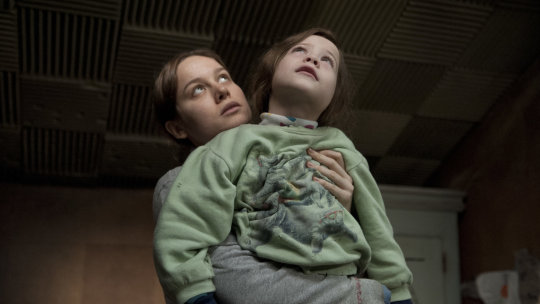
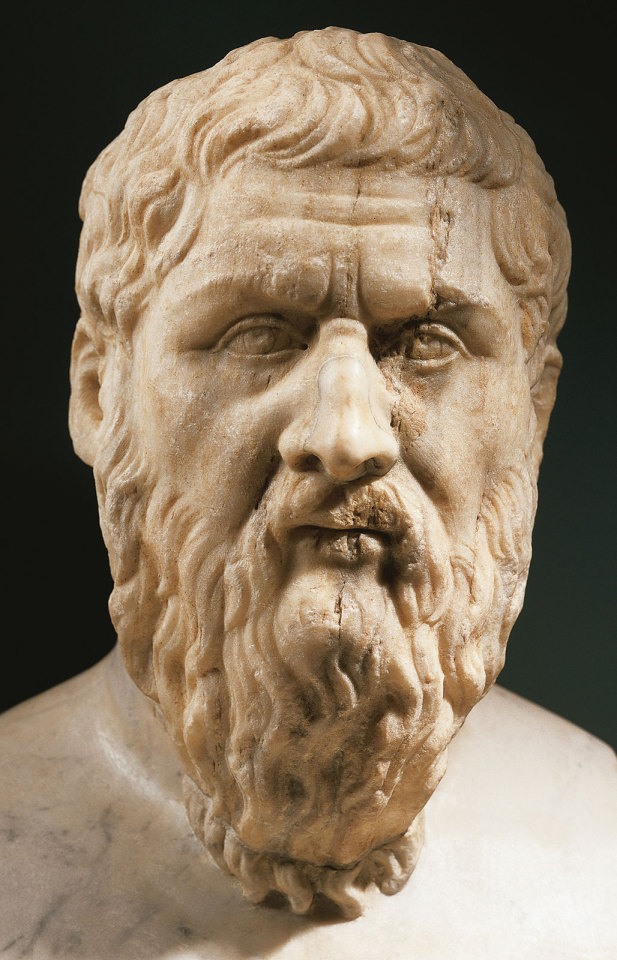
In many ways this story is retold (and inverted) in Room, which depicts a woman (Ma) who is kidnapped, raped and held captive in a shed for 7 years. During this time, she bears a child (Jack) whose only experience of the world is inside this shed, which they fondly call 'Room'. Ma and Jack eventually escape, but face new difficulties in their liberation and struggle to adapt (or re-adapt) to the world. This was particularly difficult for Biscuit to watch and analyse and it was reminiscent of her time in the Pet Store (there was no rape, but she was left for long periods with little food and virtually nobody to analyse pop-culture with).
Immediate comparison can be made between the two stories. The room represents the cave, Jack is oen of the priosners and he constructs his view of the world by observing the mere 'shadows' of the world that his senses are afforded. For example, Jack understands that 'spiders ar real, and one time the mosquito that was sucking my blood [was real]', but 'dogs are just TV' and 'the sea is too big to be real'. He believes in those things which he has directly experienced in room, but all else is disregarded - those things he perceives on the TV are never questioned, they are just not real. He even grows a certain fondness to the objects in the room and personifies them - for example, 'meltedy spoon is the best to eat with because he's more blobbier'. This reflects the 'game' that the prisoners play in Plato's Cave and the almost childish attachment that they grow to those vestigious fragments of their reality. Interestingly, as opposed to Plato's version, Ma does not try to inform Jack about the reality, but is satisfied letting him believe that room mirrors reality. Admittedly, Jack has some vague concepts of things outside of room that he has learnt from Ma, such as outerspace, planets and heaven, but these are abstract to him. They are escapism and have no grounding in reality. This perspective of the world is constructed through his senses to the extent that he doesn't believe in any existence outside of room. When Ma tries to convince Jack of an outside world to convince him to escape, she questions him by asking where Old Nick (their captor) gets their food from. He replies; 'From TV! By Magic.'
Akin to Plato's story, Jack also escapes the cave. However, the outcome is not as immediately pleasant for him as Plato imagined. Instead of being enlightened to the truths of the universe, Jack is bewildered and confused. Room was claustrophobic, but it was at least constant, whereas he finds that the real world is uncertain. He doesn't understand how basic things work, he is frightened by human interaction and seems overwhelmed by the sheer size of the planet and the number of things to observe. He unsettles Ma's father who can't bear to look at Jack without seeing the rapist of his daughter. He also can't relate to his mother's descent into depression as in the face of her family and the media, she comes to feel shame and sorrow for the things she has suffered. Despite being free, she is also living in fear. Room for her was a prison, but she knew her devil at least. Ma distances herself from Jack, unable to cope with living in the real world and even attempts suicide. For Jack, reality has only offered him destabilisation and confusion. He says; 'There are so many things out here. And sometimes it's scary.' He longs for the sanctuary of his room which had fixed outlines and was constant. His agrophobia is placated by the media and police presence outside of their family home, which creates a sort of unescapable 'room' out of their house. This is where Jack feels most comfortable.
This is an inversion of Plato's allegory and comments on contemporary fears of the outside world. We sympathise with Ma's ordeal, yet the enemies she meets in the real world (such as the media, legal fees, family issues) are the demons of our own making and all too commonly feature in our own daily ordeals. In this sense, our real world is just as scary and it's easier just to 'stay inside' [the cave].
The allegory is redeemed by a closer analysis of Ma's character. A duality appears between her self in room and the one set free. Although it may have been obvious that Jack was a metaphor for the escaped prisoner in Platos' allegory, Ma's position is more ambigious. However, instead of being a second escaped prisoner as might be first assumed on the surface (which doesn't feature in Plato's story), we shoudl recognise Ma as one of the prisoners who remains inside the cave for Jack to return to. Only her cave is not physical, it is psychological. Despite being in the real world, she cannot forget or leave room behind. Just as with Plato's analogy, it is Jack's challenge to convince Ma that there is a real world beyond the cave.
He is able to achieve this because he is propelled from his trepidations about the world by his childlike inquisition and imagination. The world scares Ma, but it begins to excite Jack. He says;
'The world's like all TV planets on at the same time, so I don't know which way to look and listen. There's doors and... more doors. And behind all the doors, there's another inside, and another outside. And things happen, happen, HAPPENING'.
One cannot help make the connection between Plato and Plato's teacher Socrates, who famously proved that even a young, uneducated boy could master the truths of universe through the Socratic method. Jack not only manages to save his mother's life, rescue her from the confides of her mental cave, but he also reaches the enlightenment that Plato promised. He brazenly comments with the intellectual hubris of a child; 'When I was small, I only knew small things. But now I'm five, I know EVERYTHING!'. By leaving the cave, he has understood and mastered the real world, just as Plato hoped philosophers would. The supposed moral of the story being that fear of the world can only be overcome by bravery and sanguinity.
In the final scene, Ma and Jack return to Room (which is now a crime scene) however they return with different motives. Ma wants to prove she has overcome the fear she felt leaving it, whereas Jack wants to regress in the childish ignorance of youth. In the final dialogue they both demonstate their growth. Jack asks if Ma can shut the door because 'It can't really be room if door's open'. Ma, who once feared the door shutting and never opening again, shuts the door to appease her son.
0 notes
Text
Annie vs Mikasa: Round 2
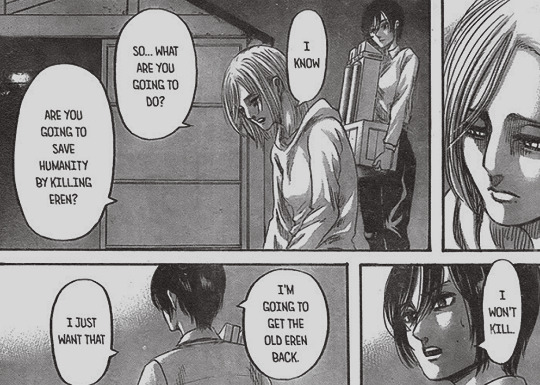
They don’t actually fight, I just couldn’t think of a good title for this post. Annie and Mikasa are a set of foils. At times their similarities only serve to irritate one another. At other times, their differences are complementary. Just like Eren / Reiner, and Bertolt / Armin, Annie and Mikasa can become each other’s worst enemies and yet at the same time offer a unique understanding to one another. Here’s an analysis of their foiling as of the latest chapter.
1. Lost Girls


Mikasa and Annie have been opposing forces in the manga ever since Eren saw it fit to compare them. If you look at them from Eren’s point of view they’re incredibly, superficially (on the outside) similiar. Both of them are the only girls in a group of two boys. Both of them are the physically strongest member of their group, and also the most confident in themselves. Annie, just like Mikasa has the ability to quickly act, and she doesn’t hesitate like Bertolt and Reiner are prone to.
Eren is someone constantly fighting against his own weakness, and that’s what causes him to trip up and hesitate. He’s always battling against the idea that he’s mediocre, that he’s all talk, that he’s unable to be strong enough to make the grand promises he makes. As a person he feels lacking, inferior. He lacks the self confidence simply to act. Which is why he gravitates towards people like Mikasa and Annie who just ACT without hesitation. He wants the single-mindedness that Mikasa and Annie have, just by being the people they are, because Eren is riddled with self doubts. Annie and Mikasa both have the strength and self confidence that Eren wants, but they don’t really care about being strong.
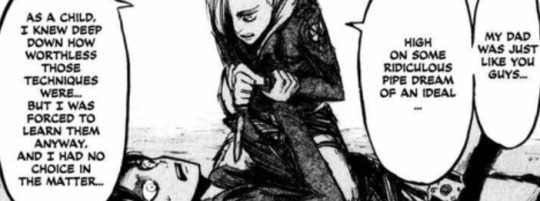
Eren would love nothing more than to be able to shut his brain off and become a soldier the way Mikasa and Annie seem to be able to do so flawlessly, but neither of them really want to be this way. The reason that Annie and Mikasa are able to shut their brains off and just fight, is because they see themselves as having fought to survive their entire life, having lost everything else.

They are both girls fighting to survive and find love in a world that they no has absolutely no love for them. They’ve both lost their places in the world, and any and all connecction to the world (except for one person) and because of that they’ve become so desperate that fighting is all they can do.
I bring up the Eren comparison because Mikasa’s been shown to be jealous of Annie in the past whenever Eren gravitated toward Annie. I don’t think Eren had any kind of romantic interest in Annie, I think he just admired her. In a way since MIkasa and Annie are so similiar, Eren can see all of the parts of Mikasa he admires in Annie (her strength, her independence) but none of the parts of Mikasa he dislikes (her codependence, her habit of always following him around).
In the female type titan arc Annie and Mikasa are characters who are incredibly similiar on the outside, especially in the way that Eren perceives them, but we learn the difference between them in their actions.
Mikasa is loyal, Annie is not. And I don’t just mean that Mikasa is loyal to the scouting corps whereas Annie is a spy. I mean, even to their small group of friends Mikasa is someone who is fiercely protective of both Armin and Eren whereas Annie will always run away from Bertolt and Reiner to protect herself. Mikasa clings to Armin and Eren as her place in this world after having lost her original family, whereas Annie completely refuses to get close to Bertolt and Reiner in the same way.
There’s also a certain irony in the way Eren perceives Annie. I mean like I said, he gravitates towards Annie because it’s all Eren thinks he admires in a person, Mikasa’s strength, but without the part of Mikasa that always clings to him. Mikasa’s loyalty towards him has always bugged him but it’s also something that Eren has also always taken for granted because look how hard he freaks out when Annie turns out to have an agenda of her own. He practically begs, and begs her not to betray the scouting corps because he can’t handle the person betrayal.

Anyway this is how we are initially presented their characters, two people incredibly similiar on the outside, but Mikasa is loyal, and Annie disloyal. Of course this is deconstructed in later arcs but we gotta get out of Eren’s POV first.
2. Lost Girls, Found
I set up their foiling in the female type titan arc to show how it’s subverted this arc. A lot of ideas set up in the female type titan arc are now being inverted in the final arc. First we learn a little more about Annie, and how even her circumstances are incredibly similiar to Mikasa.

Mikasa lost her place in the world when her family was killed. Annie never had a place. They are both girls who are incredibly unconnected to the world around them. Annie an orphan with Eldian blood, Mikasa an orphan with Ackerman blood, and the last remaining person of Asian descent inside the walls. They were also marked as different from the world around them because of their birth.
They both have an adopted family member they fixate on, because that person is their sole connection to the world around them. For Mikasa it’s Eren, and for Annie it’s her father. Mikasa’s goal is ultimately to protect Eren because by his side is her place of belonging in the world everything else comes second. Annie’s goal is ultimately to return home to her father because he is her place of belonging in the world and everything else comes second.
Both girls are incredibly, aware of the cruelty of life and how easily people can die and it can all be lost. A dead insect is used to symbolize the revelation in both cases, a dead beetle for Annie, a dead butterfly for Mikasa. For the both of them they also came to this revelation at an extremely young age.

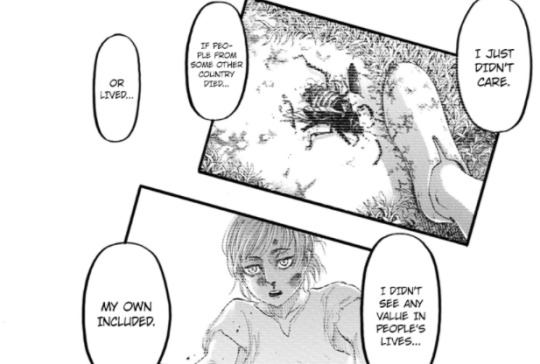
This makes them even more desperate to protect their small place of belonging in the world. Which is why they have the same selfish habit. They will forget about everything else, and run off to protect that safe place when they are pushed against a wall. Mikasa will always drop everything to run after Eren, even if it leads her to doing soemthing stupid or disobeying orders from a superior. Annie will always follow her father’s words and protect herself because she doesn’t care about the mission or the outside world ultimately.



Annie says she’d trample over other people, Mikasa doesn’t listen to Levi and charges straight at the female type titan because it’s the shortest path to Annie. It’s the same behavior, the outside world stops existing to them. Mikasa and Annie both have a small and fragile world that consists of one person they’ve decided is their family. They’re scared of the world at large, because they think they have no place in it.
The story has been gradually challenging Mikasa again and again, to care about the world outside of Eren. It starts in Trost where Mikasa realizes she can’t let herself die just because Eren died because she wants to keep his memory alive. Hange tells her that she might lose the person most important to her in the world, but she has to keep moving forward with that loss.

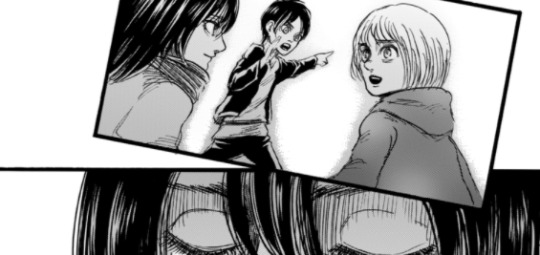
Mikasa became the first to let go of Armin, when Eren didn’t give up on begging Levi to revive Armin, even though Mikasa had always been the most fiercely protective of their little group beforehand. Floch even points out, that Mikasa is the closest to maturing because she was out of the three of them the only one able to let go. I know Floch is wrong a lot, but Floch tends to talk in theme. I mean he’s not really a character in his own right, he just… talks about the themes of the story. He’s a mouth piece for the author to make obvious comments on the themes of the story, like when he goads Jean into just quietly accepting that the world might end outside of Paradis island. If Floch says something it’s probably a theme of the story.
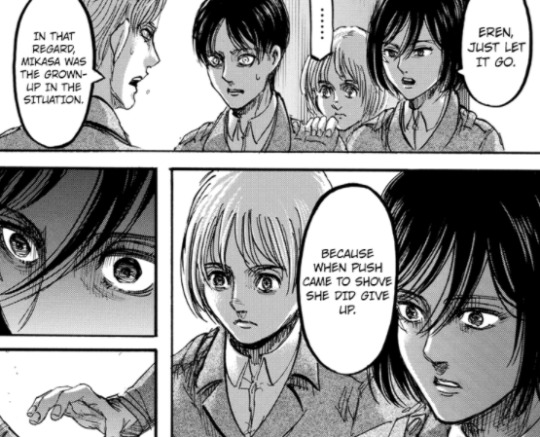
Mikasa has been pushed over and over again to let go of the person that is her place of belonging in the world. The way she does this is one, realizing how Eren’s actions affect others and two, learning to move to protect people outside of Eren.

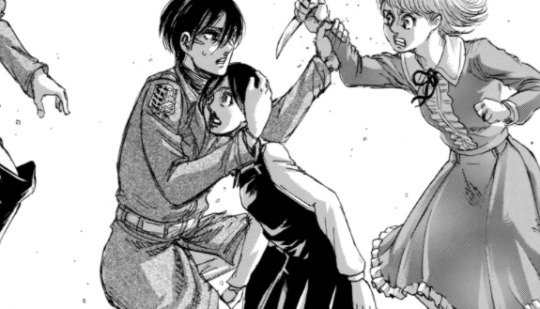
It’s Mikasa who calls out Eren for hurting children, and it’s Mikasa who moves to protect Gabi, even knowing that Gabi was the one who killed Sasha. Why? Because Mikasa herself is a lost girl. Because Mikasa knows what it’s like to lose everything as a child.
Mikasa wants to gain the strength to protect someone, because she knows what it’s like to lose everything and doesn’t really want to inflict that on someone else. However, it turns out she’s been protecting the wrong person all along. What’s she been doing then?

For both Mikasa and Annie their wish to have a family, and have some connection to the world isn’t selfish at all. In fact they can be incredibly soft and kind people to those they consider family. However, they have a tendency to tunnel vision and act selfishly when the chips are down. Mikasa enables the worst parts of Eren because she’s so codependent, and Annie is so independent she’s entirely forgotten about the world around her.
Mikasa is slowly learning what Annie already knows, her independence.
Mikasa has slowly been learning there are other things besides Eren that connect her to the outside world, whether it be her sympathies with children like Gabi and Falco who are so much like her and Eren, or her double heritage to both the Ackerman clan and her connection to Hizuru.
At the same time this latest chapter has been showing Annie the opposite. The personal connections to people that Mikasa has always clung so tightly to, and Annie has eschewed are what is slowly coming to matter more to Annie.

When Annie loses all hope, it’s her brief conversation to Armin that almost pulls her back from the edge. In fact the reason she didn’t lose her mind all that time in the crystal is because Armin kept talking to her. Mikasa needs to lose her connections to other people to learn to function on her own, but Annie needs to let other people connect to her.
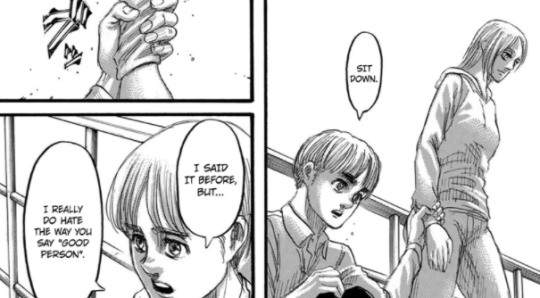
It’s Armin who pulls her back and grabs her hand when she just wants to avoid others. It’s Armin who counteracts Annie’s long held belief, that the great big world is scary to her. Annie can’t begin to accept the idea that the world might be kind too, unless she learns to accept Armin’s optimism, and his point of view. Annie needs to learn from Armin, but to do that she has to get close to him.

So in the latest chapter we see Annie and Mikasa challenging each other again. Annie and Mikasa have asked each other the most important questions they need to answer.



Can Mikasa actually kill Eren? Can she do what she needs to do? And Mikasa asks Annie the opposite questions? Can Annie follow Armin and be there for him or is she just going to run away again?
I’d say they are both at this point at the final hurdle of their arcs. Mikasa saying that she just wants the old Eren back is the problem. She needs to learn to accept the old Eren is gone. She can either try to save the current Eren, or kill the current Eren, but both of those means Mikasa has to drop her idealized image of Eren and confront the real one right in front of her. Whereas, Annie’s trying to run away one more final time before the end instead of fighting for someone besides herself and her own survival.
Mikasa needs to learn to be independent and function without Eren, and Annie needs to learn to let other people be a part of her life. She can’t live in this world all alone. The same way that Eren once told Mikasa how to live in this world, Armin could help Annie find a way to live, but only if she lets him.
Which is why the connection between these two lost girls is so important. In the Female Type Titan arc we saw them already try to kill each other. However, they’ve always had the potential to help each other find their way so they’ll be lost girls no more.
#aot 132#aot 132 spoilers#snk 132#snk 132 spoilers#attack on titan meta#annie leonhart#mikasa ackerman#eren jaeger#armin arlert#eremika#aruannie#attack on titan
163 notes
·
View notes